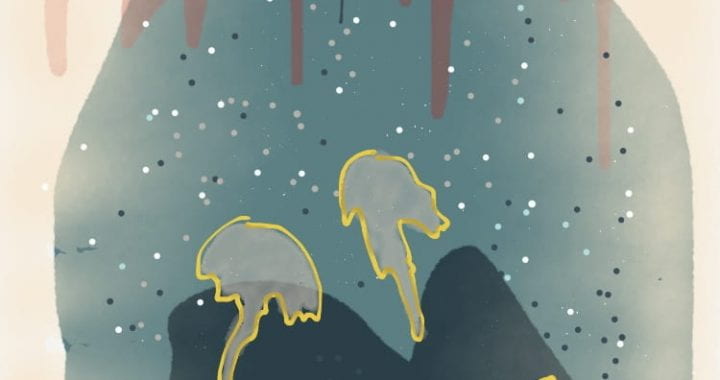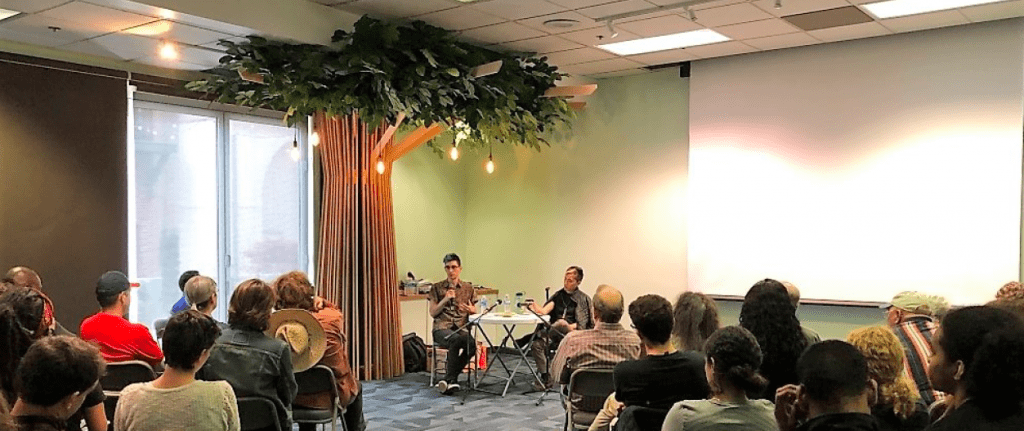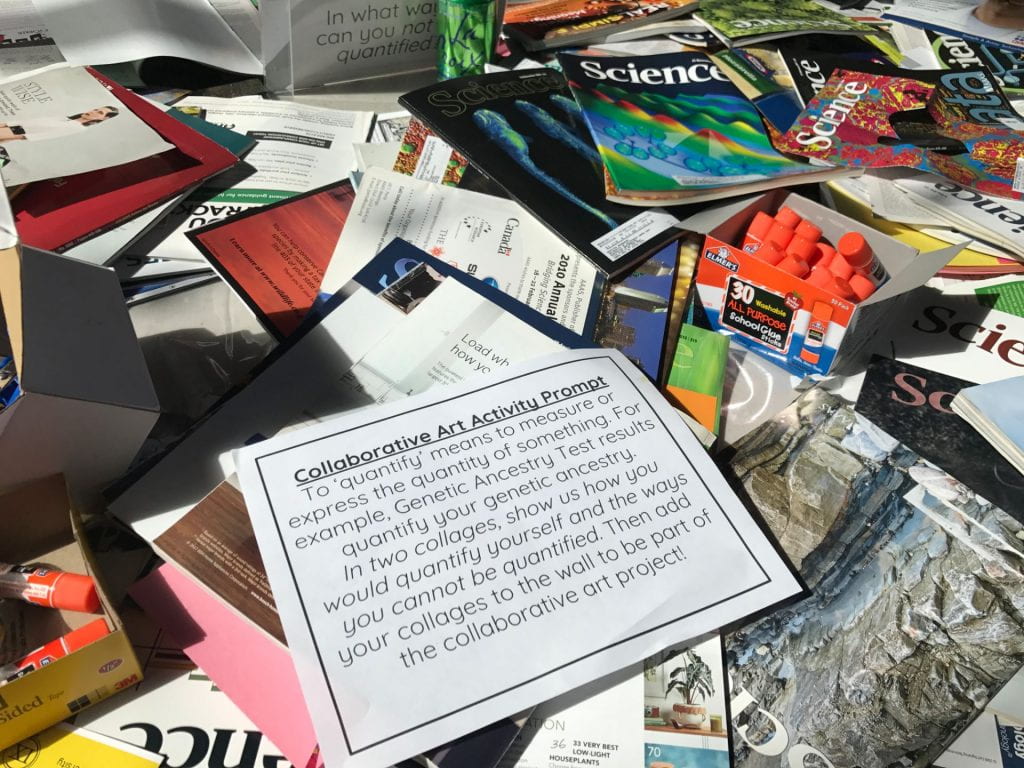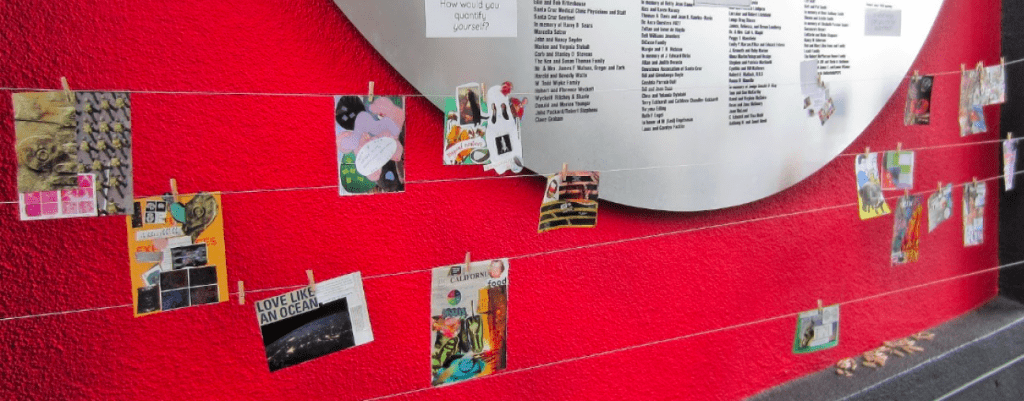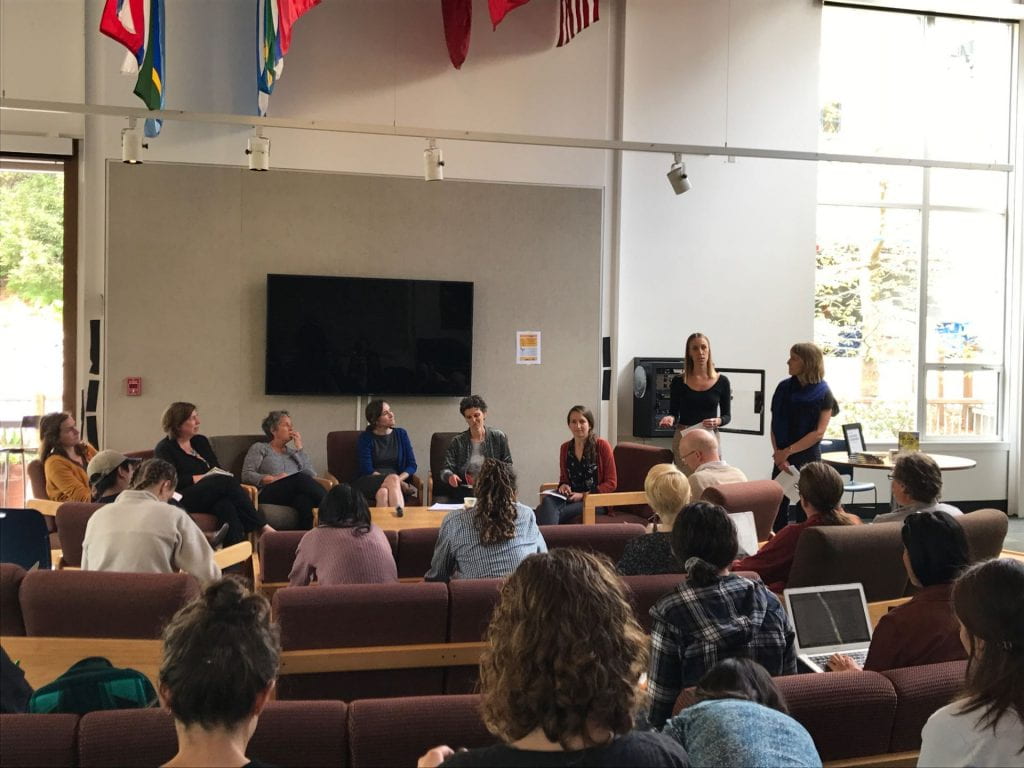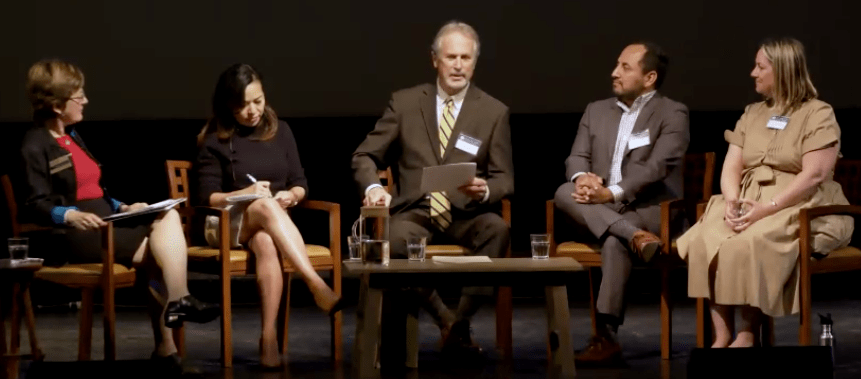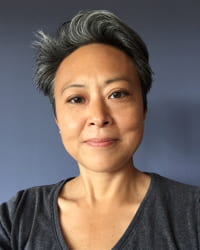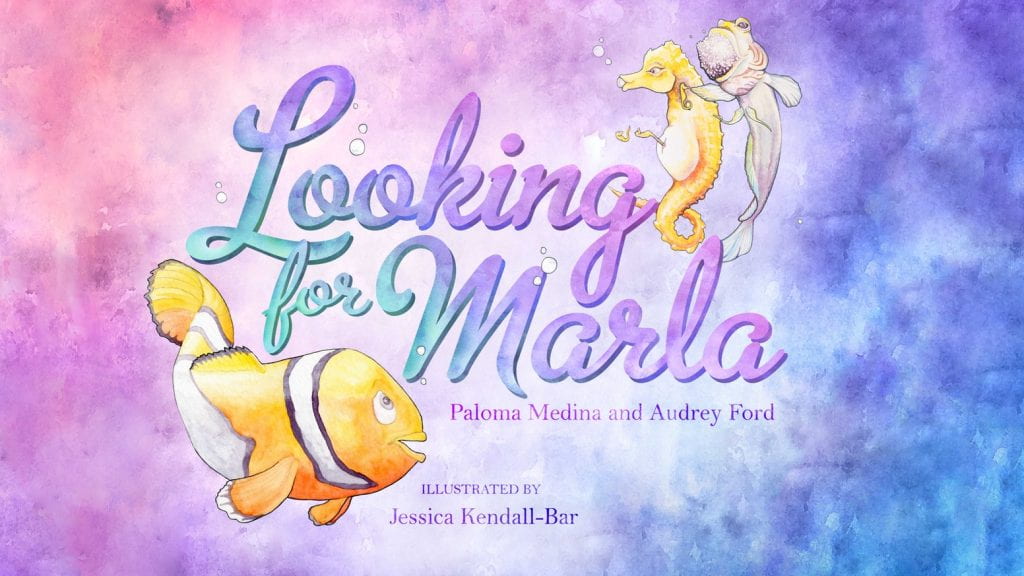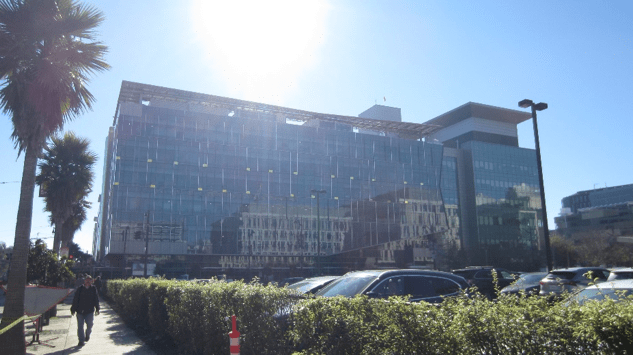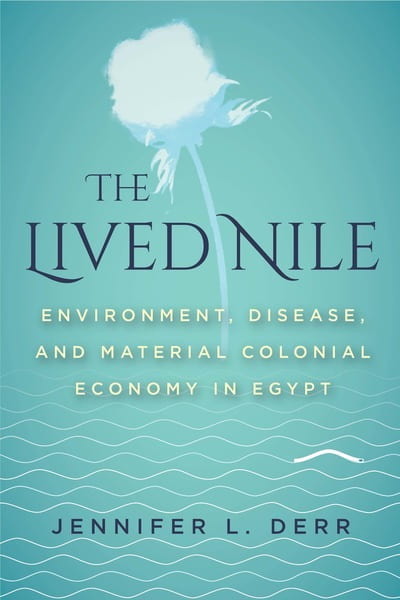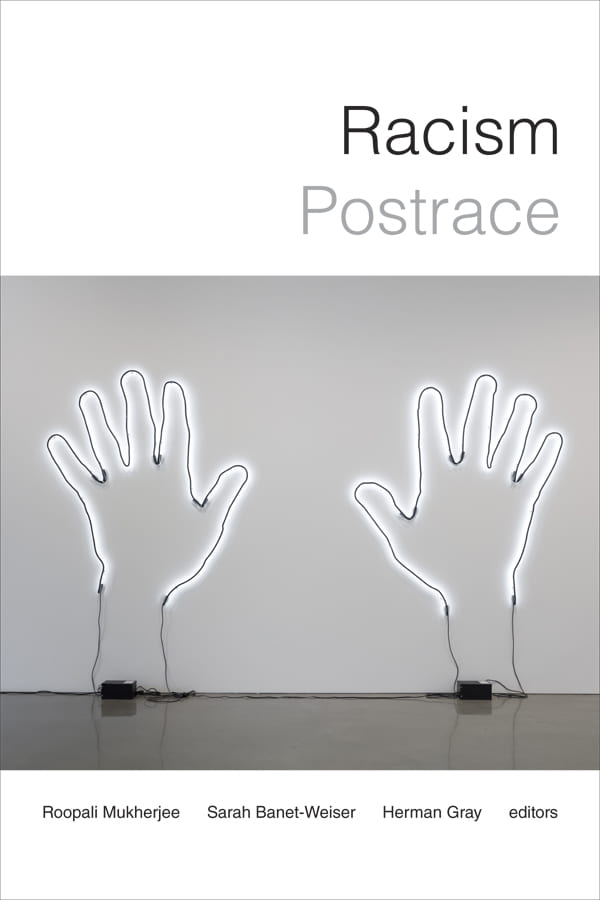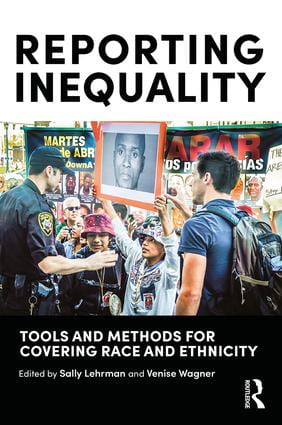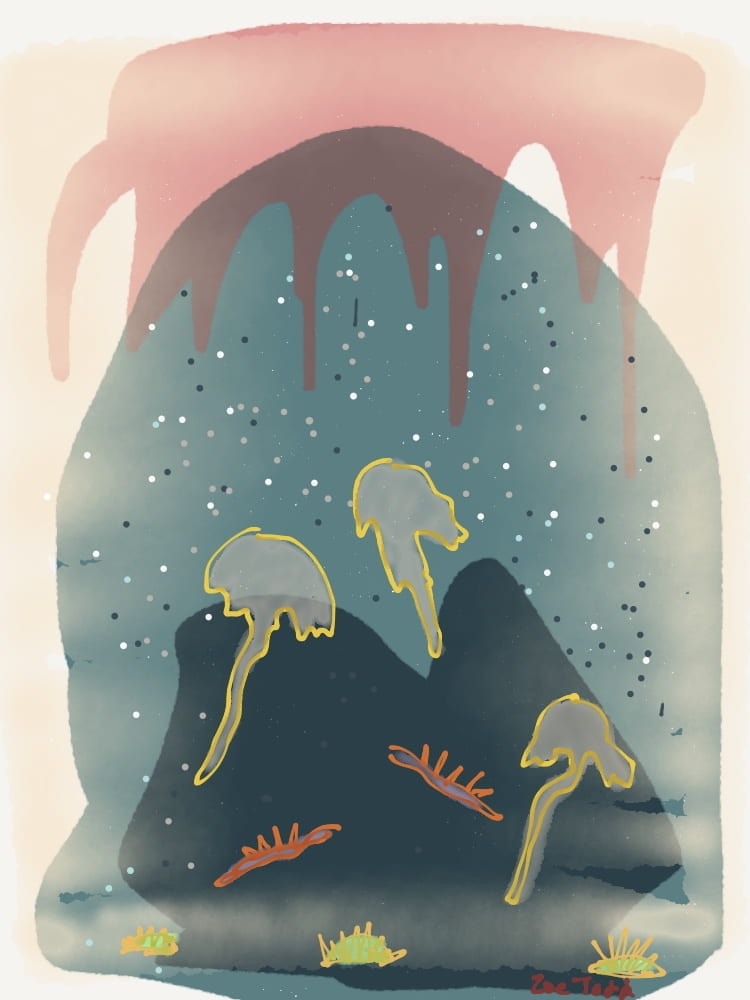Volume 12
Director’s Letter: Welcome to Science & Justice
The 2018-19 academic year was another great year for the Science & Justice Research Center. Our community initiated research project on health care in the local Santa Cruz jails, Jail/Care, produced its first results, and secured new funding and recognition. Our Just Biomedicine Research Collective had its first essay accepted for publication. Our internationally renowned Science & Justice Training Program received a grant from The Center for Information Technology Research in the Interest of Society (CITRIS) to develop Science & Justice pedagogy in collaboration with colleagues at UC Davis.
Many new faculty also joined our Center, and helped to launch new initiatives, including our Theorizing Race After Race Working Group. We are particularly proud of our undergraduate and graduate students, many of whom earned awards and distinction. They include Politics undergraduate Wessede Barrett and Feminist Studies undergraduate Nikobi Petronelli for their work on Just Biomedicine, and Roxy Davis for her work on Jail/Care.
The work of Science & Justice continues to be in the headlines, making a critical difference in California, the nation and globally. Our faculty and students were out front both in the press, and in their newly published books, addressing the resurgence of racial reductionism in the life sciences, the profound questions of ethics and justice raised by continued rise of big data, and the destruction of marine and terrestrial ecosystems. Our research was supported by the National Science Foundation, the National Institutes of Health, as well as UC initiatives in arts and the sciences.
Our events continue to highlight the unusual and inspiring collaborations and conversation Science & Justice creates. Highlights this year included “No Really, What Percentage are You?” Race, Identity & Genetic Ancestry Testing, a half-day event organized by our Science & Justice Training Program Fellows at the Museum of Art and History, and Safiya Noble’s talk to a packed Kresge Kresge Town Hall about her best-selling book on racist and sexist algorithmic bias in commercial search engines.
Visitors and participants continue to visit us from all over the nation and world, including over the last year from Canada, Singapore and universities throughout the United States, helping us to continue to grow Science & Justice as a space for national and transnational research and thinking.
As we look forward to the year to come, we appreciate this chance to pause and to share with you our accomplishments of the last year.
Jenny Reardon
Founding Director of the Science & Justice Research Center, Professor of Sociology at UC Santa Cruz
The Science & Justice Mission
The Science & Justice Research Center at the University of California, Santa Cruz, is a globally unique endeavor that innovates civic spaces and collaborative research practices for exploring the places where questions of science meet questions of justice. Biomedical innovation, species extinction, toxic ecologies, healthcare reform and many other contemporary matters of concern provoke questions that traverse multiple intellectual, institutional and social worlds. We foster the alliances and cultivate the empirically rigorous research needed to address these challenges and help forge more livable worlds. The Center is home to the Science & Justice Working Group, the Science & Justice Graduate Training Program, and several sponsored research projects and research groups. The initiative builds on the UC Santa Cruz campus’ historic commitments to social justice and strengths in science studies and interdisciplinary research.
Science & Justice Leadership Team
DIRECTOR | Jenny Reardon, Professor of Sociology
DIRECTOR of Teaching the SJTP | Karen Barad, Professor of Feminist Studies
CENTER MANAGER | Colleen (Massengale) Stone
GRADUATE STUDENT RESEARCHER | Andy Murray, UCSC Sociology
Science & Justice Steering Committee, 2018-19
Karen Barad, Professor of Feminist Studies
Lindsey Dillon, Assistant Professor of Sociology
James Doucet-Battle, Assistant Professor of Sociology
Jenny Reardon, Professor of Sociology
Sustaining a Vibrant SJRC Community
The Science & Justice Research Center is the home of a vibrant, collaborative community. Located in Oakes College, SJRC hosts visitors from across the UC system and around the world. The SJRC community is committed to sustaining an experimental ecosystem for novel ideas, dialogues, methods and collaborations. The Science & Justice Working Group remains the experimental lifeblood of our collective work. We also host regular reading groups and experimental mixers with affiliated graduate students and faculty who seek to further investigate the meanings and practices of science and justice.
Visiting Scholar Program
Since 2009, the SJRC Visiting Scholars Program has been a vibrant hub for interdisciplinary scholars across the UC-system, the nation and the globe. The Science & Justice Research Center offers opportunities for visiting scholars at all levels of their career (regardless of institutional affiliation) to participate in the community through research collaborations, reading groups and experimental mixers. In the 2018-2019 academic year, the Center hosted three visiting scholars and accepted applications for the coming academic year: refer to Appendix 1 to learn more about them.
Highlights from the Science & Justice Working Group, Experimental Mixers, Writing and Reading Groups
The Science & Justice Working Group (SJWG) provides a convivial and novel space to cultivate emerging connections, spark new questions for research, and nurture our communities’ collaborative ties. In addition to formally convening the SJWG, our informal experimental mixers are a lively and open space for all SJRC community members. Here we describe some of the highlights of the year’s events (All events of the SJRC are listed in Appendix 2).
The Center began the 2018-19 academic year with the annual Meet & Greet on October 17. In addition to a chance to celebrate the new academic year and enjoy each other’s company over nice food and drink, this is always a great chance to welcome new members, welcome back others, and share current work to foster emerging collaborations.
On November 14 Science & Justice Steering Committee member Lindsey Dillon (Assistant Professor of Sociology) kicked off the Works-in-Progress Series by presenting on the redevelopment and racial capitalism in San Francisco. This was the first year of our in-progress works series. The goal of the series is to offer our faculty and students a space in which to troubleshoot conceptual, methodological and political issues encountered in their research and practice.
Continuing the practice, Lindsey Dillon, again hosted weekly Science & Justice Writing Together. Sessions were open to all SJRC students, faculty and visiting scholars to establish a regular writing routine exploring science and justice. Each session, writers engaged in six 25-minute mini-sessions with a 5-minute break in between. Sessions were scheduled quarterly based on interest and availability.
Over the years, the SJRC has spawned a variety of informal reading groups. These reading Groups offer the community the chance to discuss key questions across disparate and interdisciplinary research literature. This year, the Theorizing Race After Race research cluster met two to three times a quarter, focusing their readings on the history of debates over the concept of race in science. The group spawned a proposal for developing curriculum. The plan is to submit the proposal to the Russell Sage Foundation.
On January 23, 2019, the SJRC Working Group continued its ongoing exploration of the moral imaginaries of Silicon Valley in the panel discussion, Finance Moves West: Disruption or the Rise of the Machine? With UC Santa Cruz alumna Sherry Paul, Distinguished Professor of Economics and Director of the UCSC Center for Analytical Finance Nirvikar Singh, and Professor of Environmental Studies and Sociology and Director of the UC Santa Cruz Institute for Social Transformation, Chris Benner, we explored the connections between finance, algorithms, and justice. The conversation was co-sponsored by the Center for Analytical Finance and the Santa Cruz Institute for Social Transformation. A full rapporteur report can be found at: https://scijust.ucsc.edu/2019/01/23/finance-moves-west/.
On March 12, Associate Professor Safiya Umoja Noble (Departments of Information Studies and African American Studies, UCLA) came for a day-long visit to campus. SJRC coordinated for Noble to meet with faculty and graduate student instructors of The Humanities Institute’s Data and Democracy Initiative to discuss the four spring 2019 courses THI sponsored as part of their Mellon Foundation Expanding Humanities Impact and Publics (https://thi.ucsc.edu/initiatives/data-and-democracy/). Noble then recorded an interview with Sylvanna Falcón (Associate Professor of Latin American and Latino/a Studies, Director of the UCSC Research Center for the Americas, and Producer/Host of Voces Críticas’ public affairs program) for the KZSC Voces Críticas/Critical Voices podcast series. The program can be listened to at: https://criticalvoices.sites.ucsc.edu/2019/03/27/march-2019/. Noble also met with faculty and students of SJRC’s Theorizing Race After Race group and Director Jenny Reardon’s graduate seminar Sociology 260: Culture, Knowledge, Power. The evening closed with Noble speaking to a filled Kresge Town Hall about her best-selling book on racist and sexist algorithmic bias in commercial search engines, Algorithms of Oppression: How Search Engines Reinforce Racism (NYU Press, 2018). A public pizza reception with undergraduate students followed, with a second (non public) reception at the Kresge Provost House. Noble’s visit was co-hosted by Kresge College’s Media & Society Seminar Series and co-sponsored by the Genomics Institute Office of Diversity, the Humanities Institute, the department of Sociology, and the Center for Data, Discovery and Decisions (D3). More information on the days activities can be found at: https://scijust.ucsc.edu/2019/03/12/mar-12-noble-algorithms-of-oppression/.
The year included additional Works-in-Progress sessions with SJRC Steering Committee members. On February 27, Professor of Feminist Studies Karen Barad discussed her research on matters of force, entangled nuclear colonialisms, quantum temporalities, and the otherwise of being. On May 1, Professor of Sociology and SJRC Center Director Jenny Reardon discussed her ongoing research conducted by biking through the prairies and small towns in Kansas. And, on May 8, Assistant Professor of Sociology James Doucet-Battle discussed his book project, Recruiting Sweetness: Translating Race, Risk, and Gender in Type 2 Diabetes Research, that explores the knowledge emerging from the biological and racial differences in diabetes research since the genomic revolution.
Science & Justice Graduate Training Program
The SJRC is the home to the globally unique Science & Justice Training Program (SJTP). The program teaches graduate students from across all five divisions learn how to collectively address the moments where questions of science meet questions of justice. We not only teach why it’s important to collaboratively ask questions, but also propose when and how to ask these questions.
As part of the Science & Justice Training Program, this year SJRC offered a two-part Op-Ed Workshop on writing opinion pieces about science and society issues to our SJTP. On March 6 and 13, award winning science journalist Sally Lehrman, walked faculty and graduate students through the process of conceiving, writing and placing articles about research in non-academic publications. Lehrman also spoke at a campus-wide event on the Trust Project she directs.
During the 2018-19 academic year, two groups of our S&J graduate Training fellows brought their final projects to fruition in the form of events.
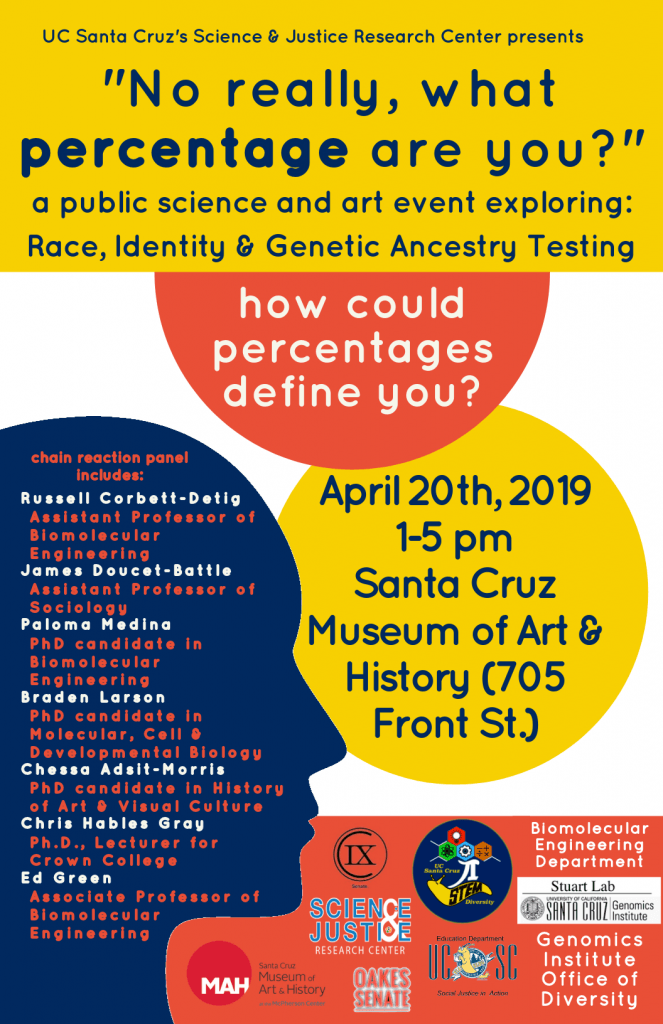 The first event, “No Really, What Percentage are You?” Race, Identity & Genetic Ancestry Testing was organized by SJTP fellows and graduate students Jon Akutagawa (Biomolecular Engineering), Dennis Browe (Sociology), Maggie Edge (Literature), Dorothy R. Santos (Film & Digital Media) and Caroline Spurgin (Education) with undergraduate fellow Diana Sernas (Mathematics), as pictured below.
The first event, “No Really, What Percentage are You?” Race, Identity & Genetic Ancestry Testing was organized by SJTP fellows and graduate students Jon Akutagawa (Biomolecular Engineering), Dennis Browe (Sociology), Maggie Edge (Literature), Dorothy R. Santos (Film & Digital Media) and Caroline Spurgin (Education) with undergraduate fellow Diana Sernas (Mathematics), as pictured below.
In a chain reaction format (a semi-structured conversation through a chain of questions and dyads), panelist: Chessa Adsit-Morris (Graduate Student of History of Art & Visual Culture), Russ Corbett-Detig (Professor of Biomolecular Engineering), James Doucet-Battle (Assistant Professor of Sociology), Ed Green (Associate Professor of Biomolecular Engineering), Chris Hables Gray (Lecturer, Crown College), Braden Larson (Graduate Student of Molecular, Cell, & Developmental Biology), and Paloma Medina (Graduate Student of Biomolecular Engineering, Science & Justice Fellow) discussed questions of racial justice and identity raised by the rise of Direct to Consumer genetic testing. The discussion was moderated by SJTP fellow Dorothy R. Santos (Film & Digital Media).
In addition to the experimental conversational format, various activities employing science and art filled the museum’s lobby and atrium, including an installation by artist Heather Dewey-Hagborg. Large educational posters about genetic ancestry testing hung from the ceiling. A collaborative art-making and collage station lined the atrium wall, and a curated playlist looped genetic ancestry testing videos.
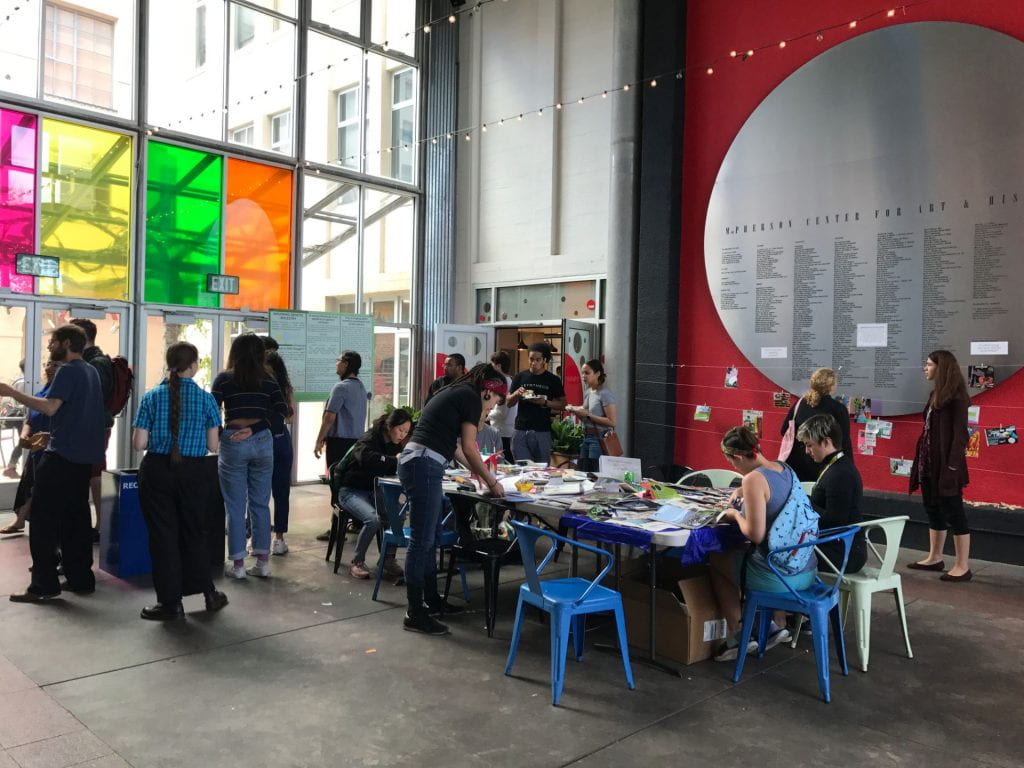
Magazines, paper, and supplies for making a collage answering the question:
What are the ways you can and cannot be quantified.
Co-sponsors included the School of Engineering NIH Training Grant, College Nine Student Senate, the departments of Biomolecular Engineering, Education, and the Genomics Institute Office of Diversity, Oakes College Senate, and the Stuart Lab. A rapporteur report is available at: https://scijust.ucsc.edu/2019/04/20/april20-what-percentage-are-you/
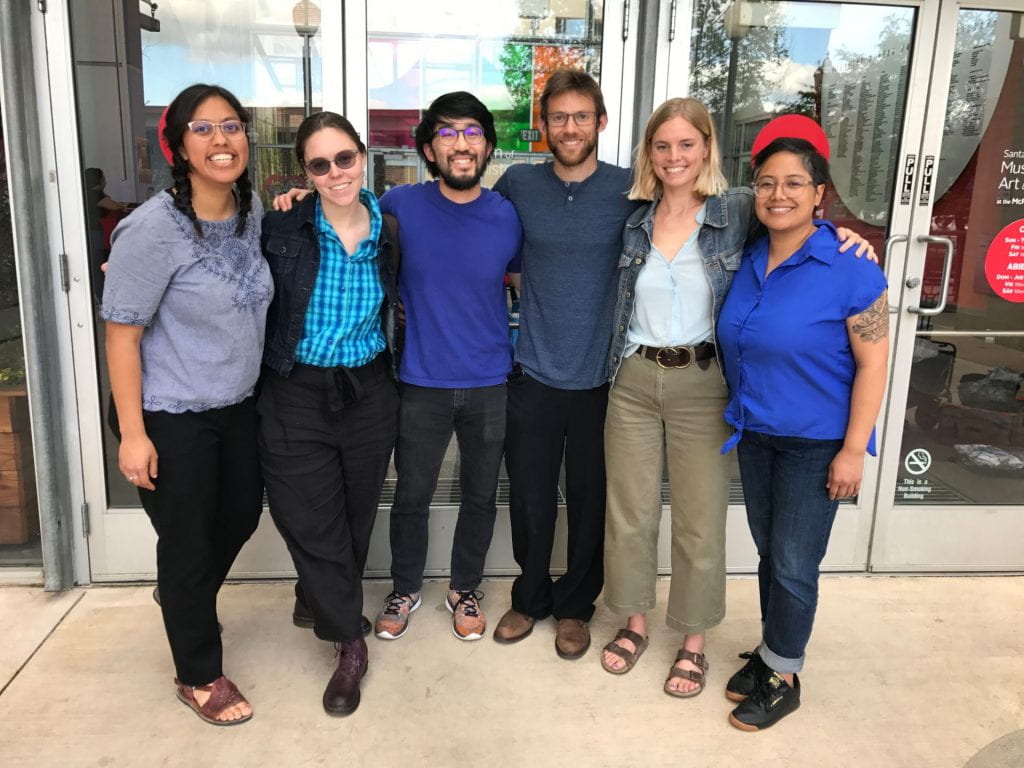
In front of the Museum of Art & History stands SJTP undergraduate fellow Diana Sernas (Mathematics) with graduate fellows Maggie Edge (Literature), Jon Akutagawa (Biomolecular Engineering), Dennis Browe (Sociology), Caroline Spurgin (Education) and Dorothy R. Santos (Film & Digital Media).
Following the event, fellows Jon Akutagawa (Biomolecular Engineering) and Diana Sernas (Mathematics) displayed the educational posters and spoke with students and faculty at the annual April 25 DNA Day.
The second event, The Futures of Critical Food Studies, was organized by SJTP fellows and graduate students Erica Zurawski (sociology) and Halie Kampman (anthropology). On May 10, they gathered scholars in critical food studies and agriculture to share histories and discuss the future of this pioneering field. As one of the most innovative and internationally recognized universities for critical food studies, S&J Affiliate Julie Guthman (Professor of Social Sciences, UC Santa Cruz) provided a synopsis of UCSC’s unique role in developing the field.
Questions were raised about the accessibility and boundaries of food studies, and the degree to which it may work with or alongside other fields, including science and technology, biotechnology, and biology. Speakers emphasized the challenges of interdisciplinarity, and the benefits of working across parallel fields, like critical agrarian studies.
To deepen and diversify the collaboration, speaker, Elizabeth Hoover (Manning Assistant Professor of American Studies, Brown University) encouraged moving towards “indigenizing,” rather than “decolonizing” institutions and practices. Focusing on the importance of collaboration, co-labor and co-scholarship, the keynote address was formatted as a conversation between Ashanté Reese (Sociology and Anthropology, Spelman College) and Savannah Shange (Anthropology, UC Santa Cruz) about Reese’s new book Black Food Geographies (UNC Press 2019).
Speakers explored the ever-changing nature of scholar-activism and called for attention to work and publications that are under-recognized (ie: #citeblackwomen), and new kinds of relationships that offer new ways of experiencing the field that foster more representation and care.
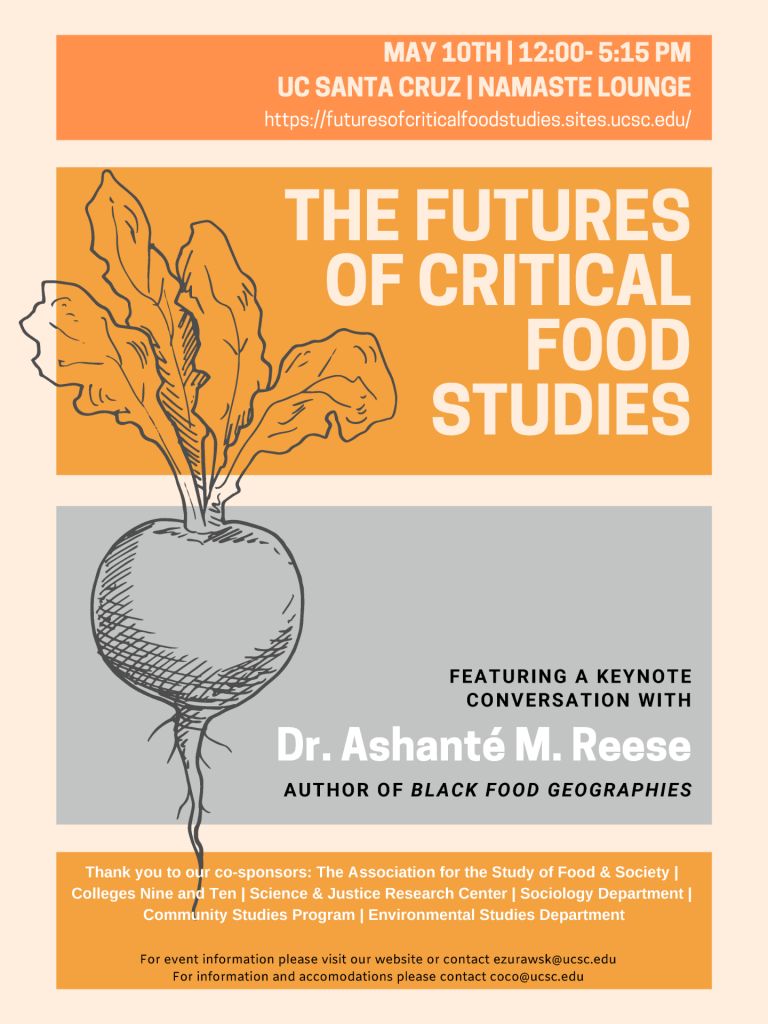 Other participants in the conversation included Professors: Alison Hope Alkon (Sociology, University of the Pacific), Charlotte Biltekoff (American Studies and Food Science and Technology, UC Davis), Melissa Caldwell (Anthropology, UC Santa Cruz; former editor of Gastronomica), Madeleine Fairbarin (Environmental Studies, UC Santa Cruz), Rafi Grosglik (Sociology, UC Davis), Elizabeth Hoover (American Studies, Brown University). Conversations were moderated by UCSC graduate students: Chris Lang (Environmental Studies), Allyson Makuch (Environmental Studies), Emily Reisman (Environmental Studies), and Erica Zurawski (Sociology). Undergraduates Arden Rosenthal, Manaiya Scott, and Gabriela Matejo-Saja served as critical listeners.
Other participants in the conversation included Professors: Alison Hope Alkon (Sociology, University of the Pacific), Charlotte Biltekoff (American Studies and Food Science and Technology, UC Davis), Melissa Caldwell (Anthropology, UC Santa Cruz; former editor of Gastronomica), Madeleine Fairbarin (Environmental Studies, UC Santa Cruz), Rafi Grosglik (Sociology, UC Davis), Elizabeth Hoover (American Studies, Brown University). Conversations were moderated by UCSC graduate students: Chris Lang (Environmental Studies), Allyson Makuch (Environmental Studies), Emily Reisman (Environmental Studies), and Erica Zurawski (Sociology). Undergraduates Arden Rosenthal, Manaiya Scott, and Gabriela Matejo-Saja served as critical listeners.
The event was supported by a grant from The Association for the Study of Food and Society. In an interview with the association, Zurawski discussed her work in food justice and colonization, as well as her transdisciplinary work as part of Science & Justice at UC Santa Cruz. Additional co-sponsors were UC Santa Cruz College’s 9 and 10, the departments of Environmental Studies, Sociology, and the Community Studies program. A full event description and rapporteur report can be found at: https://scijust.ucsc.edu/2019/05/10/critical-food-studies/.
As Training Program students graduate, they take the skills and experience they gained in the program into the next stages of their careers in universities, industry, non-profits, and government. On April 11th, founding Training Program Fellow, Tiffany Wise-West participated in the 6th Annual Climate Science Conference hosted by UC Santa Cruz held at the Rio Theatre. The conference, Climate Justice: Linking Science to Just Action brought together diverse perspectives and offered insight into connecting the best science to actions that will help all communities respond to changes in climate. Wise-West is the sustainability and climate action manager for the City of Santa Cruz Climate Action Program. A recording of the conference can be found at: http://www.ustream.tv/recorded/121355342.
Founding Training Program Fellow Elaine Gan was awarded one of five 2019 Distinguished Graduate Student Alumni Awards.
Gan holds both an M.F.A. in digital arts and new media (2011) and a Ph.D. in film and digital media (2016) from UC Santa Cruz. Currently, Gan is an assistant professor and faculty fellow at the Center for Experimental Humanities and Social Engagement at New York University, Graduate School of Arts and Science and co-leads two new initiatives: Multi-Species Worldbuilding Lab, launched in February to develop media projects about climate change, and Radical Ecologies Lab or RADlab, launching this fall to develop graduate and undergraduate curriculum on interdisciplinary approaches to power and ecology.
Justice Sparks Innovative and Original Research
The Science & Justice Research Center continues to be an exemplar of how to transform commitments to justice into collaborative research projects. We formulate new methods and institutional practices where scientists and engineers work alongside social scientists, humanists, ethicists, artists and diverse public communities. SJRC affiliates pursue local, regional, national, and international research collaborations on issues that inform and affect institutional and public policy. Below is a sample of the ongoing research members of our community conducted under these themes (for a complete list, refer to Appendix 3).
Jail / Care: Amplifying Santa Cruz Community Voices on Health & Incarceration
This year Science & Justice continued work on the Jail / Care: Amplifying Santa Cruz Community Voices on Health & Incarceration project with Sin Barras, a community group formed in 2012 dedicated to prison abolition. Sin Barras approached SJRC in 2017 after a series of preventable deaths occurred within the local jail to explore the possibility of researching the quality and accessibility of health care in Santa Cruz County jails.
The preliminary study—designed by research team members in sociology (Jenny Reardon, Kate Darling), film and digital media (Sharon Daniels), as well as members of Sin Barras—involved 14 semi-structured interviews with formerly incarcerated people. Interviews were coordinated and conducted by Psychology Graduate Student Roxy Davis (funded by the Blum Center), and focused on experiences from those who received health care or services directly from inside the local jail. Results of the preliminary study was presented and reported on by campus news writers at: https://news.ucsc.edu/2019/02/bullock-blum.html. Over the summer of 2019 Davis convened a community advisory panel for the project
Moving forward, in fall 2019, Davis along with undergraduate student Priyanka Kulkarni (Sociology, Oakes), will conduct additional interviews with formerly incarcerated people. They will also interview service providers in community health agencies. The research team will then code and analyze interview data. Based on this, Daniels will lead the development of an interactive, online multimedia documentary that amplifies the voices of formerly incarcerated individuals. Kulkarni also plans to write a senior thesis (advised by Steering Committee member and Assistant Professor of Sociology James Doucet-Battle) tentatively titled, “Healthcare in the Santa Cruz Jails: a comparative analysis of the health services of the three SCC jails: Blaine, Main Jail, Roundtree.”
Theorizing Race After Race
This year, wIth Director Jenny Reardon and SJRC affiliate and Assistant Professor Camilla Hawthorne formed new working group, Theorizing Race after Race (TRaR). TRaR seeks to develop a framework for grappling with reconfigurations of race after the supposedly ‘post-racial’ moment. Our goal is to understand how knowledge of the genome and ideas of human difference circulate, taking on different meanings across diverse historical-geographical contests. The group convened several meetings throughout the academic year with campus scholars such as Associate Professor of Anthropology and Director of the UCSC Human Paleogenomics Lab Lars Fehren-Schmitz. The group also discussed the March 2018, New York Times op-ed, entitled “How Genetics is Changing Our Understanding of ‘Race’” by Harvard geneticist David Reich. SJRC continued cataloguing the aftermath of Reich’s article on via its blogpost: Developing: Debate on ‘Race’ and Genomics.
Director Jenny Reardon continued her public work responding to the debates sparked by the Reich editorial, and in spring was interviewed by UCSC’s Scientific Slug Magazine in a spring article titled, “Are Genetic Tests Racial Science in Sheep’s Clothing?” (pg 12).
Queer Ecologies Research Group
SJTP graduate fellow Paloma Medina (Biomolecular Engineering and Bioinformatics studying genetic ancestry and evolution) continued to lead the Queer Ecologies Research Cluster. They met every quarter and organized a film series to investigate how sexuality and concepts of nature have been historically linked. Queer Ecologies seeks to examine the historical making of the natural as it relates to sexuality while communicating the overwhelming diversity of sex and gender in biology.
Medina also continues to collaborate with Ecology and Evolutionary Biology graduate student Jessica Kendall-Bar on their children’s book project, Looking for Marla (originally Finding Marla). Their book reimagines the 2003 Disney film Finding Nemo through the lense of queer studies and the biological sciences. In reality, off the big screen, clownfish, like characters Nemo and Marlin, are sequential hermaphrodites and transform from male to female when the matriarch of their colony is removed, such as by death.
Looking For Marla asks what Finding Nemo would look like through a queer biological lens? How might the biological sciences expand our imaginaries around sex and gender expression?
Building on the successful Winter 2018 presentations at Watsonville and Santa Cruz youth groups of The Diversity Center of Santa Cruz County, Looking For Marla will again be presented in Summer 2019 and officially launched in fall 2019.
The story was recently reported on by campus news-writers and is available at: https://news.ucsc.edu/2019/07/kendall-bar-jessica.html. More on Looking for Marla can be found at: https://qerc.github.io/2019/07/09/looking-for-marla.html.
Over the summer of 2019, SJTP graduate fellow Krisha Hernández (anthropology) began working with Medina and the Queer Ecologies cluster to incorporate into their meetings discussion on methodological and theoretical engagements with nonhumans and Indigenous dimensions as relating to Land.
Just Data
SJRC continues to build on the continued success of its 2016 NSF funded meeting Just Data? Justice, Knowledge and Care in an Age of Precision Medicine. Director Reardon and former Assistant Director Kate Darling (now Assistant Professor of Sociology at the University of Maine, Augusta) were invited to present on the co-edited thematic collection for Engaging Science & Technology Studies at a Wenner Gren workshop in London in June 2020.
The Just Biomedicine Research Collective also continued its work examining the meeting of biomedicine, biotechnology, and big data along the Third Street corridor in the Mission-Bay neighborhood of San Francisco.
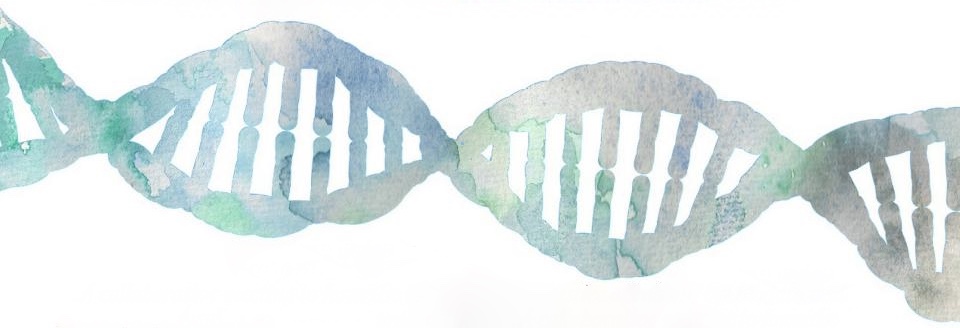
Original watercolor artwork produced by UCSC undergrad Morgan Smith for the May 2016 Just Data? conference.
The Collective is convened by SJRC Director Jenny Reardon and SJTP Graduate Fellow Dennis Browe (sociology). The 2018-2019 team included SJRC graduate student researcher Andy Murray (sociology) and undergraduate students Wessede Barrett (sociology, politics) and Nikobi Petronelli (feminist studies), as well as a visiting undergraduate researcher, Emma Mitchell-Sparke who joined for the 2018 summer from Tufts University. Both Barrett and Petronelli graduated in Spring 2019. Petronelli wrote a superb senior thesis overseen by Reardon and Professor of Feminist Studies and SJRC Director of Teaching Karen Barad from her work with the collective entitled “Seeing Through Concrete: Agential Realism and The Living History of a Building that Could Not Be Documented,” a study of the historic Arthur Coleman Health Clinic located in the Bayview and is one of Just Biomedicine’s key sites of investigation. Barrett received a Valerie Fuette Scholarship that allowed her to focus more on the Just Biomedicine Project.
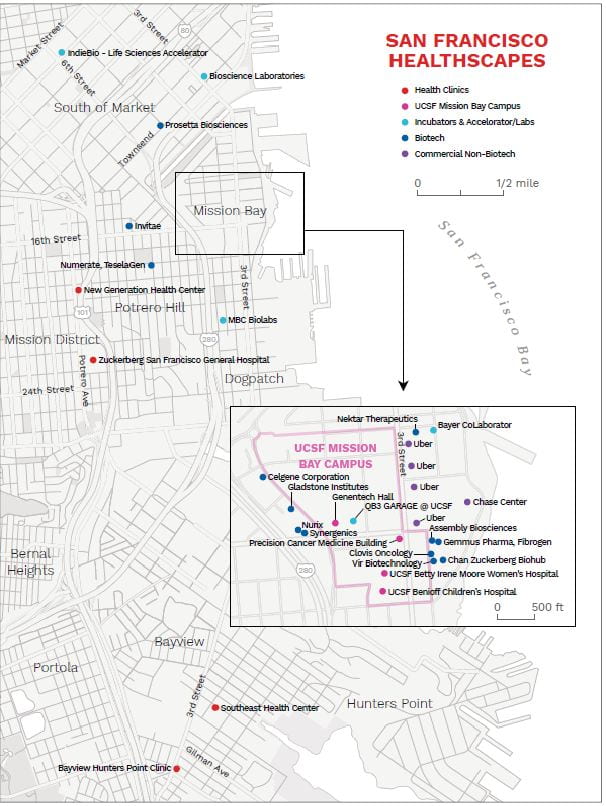
San Francisco Healthscapes digital map
(mock designed for AEMP’s Print Atlas by Molly Roy; not finalized version).
Dennis Browe continued building the digital mapping project: Visualizing Health & Wealth in a California Biohub Through Digital Mapping, originally begun by undergraduate researchers Hannah Finnegold (Biology, Law & Society) and Emily Caramelli (Sociology, Politics).The team continued working with the Anti-Eviction Mapping Project (AEMP, to further explicate and visualize stratified health in San Francisco and AEMP’s design team and cartographers to produce a new version of the “San Francisco Healthscapes” map. In Spring 2019, the team submitted their chapter, “Just Biomedicine on Third Street? Health & Wealth Inequities in San Francisco’s Biotech Hub” to be included in AEMP’s upcoming Atlas and interactive website. The Atlas, Counterpoints: Bay Area Data and Stories for Resisting Displacement, is scheduled to be published by PM Press in Spring 2020.
This year the team also continued to interview leading biomedical scientists, administrators, and community health advocates related to precision medicine initiatives, as well as continue documenting the construction of UCSF Mission Bay campus and its immediate surroundings. In March 2019, the team, partnering with SJRCs allied research collective (Seeing Like a Valley) led a walk along the Third Street corridor in Mission Bay for a group of advanced undergraduate students in a ‘Critical History of Silicon Valley’ course at the University of San Francisco. During the walk, students were offered a presentation about the Just Biomedicine project and shown some of the key hotspots of the research, including the newly constructed UCSF Precision Cancer Medicine Building and Genentech Hall, which opened in 2003.
Over Summer 2019 they worked on a draft of a culminating article to be published in a peer-reviewed journal read by both medical professionals and social scientists.
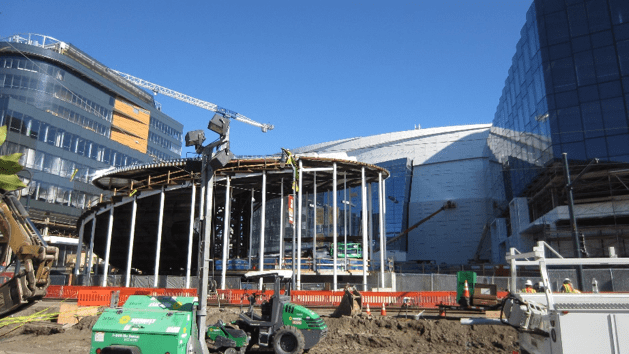
Construction of the Uber Headquarters, with new Warriors arena in background, located just across the street from the PCMB. January 25, 2019. Photo by Dennis Browe.
Finally, in April 2019, team members Reardon and Browe attended Columbia University’s inaugural Precision Medicine & Society conference, where they presented some of the initial findings of the work.
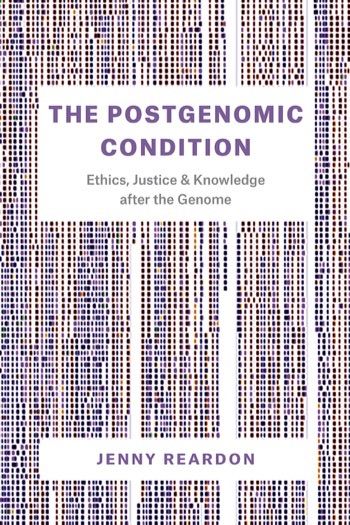
The Postgenomic Condition: Ethics, Justice, and Knowledge After the Genome (University of Chicago Press, 2017)
Finally, the SJRC continues to build on the platform provided by the publication of Reardon’s second book, The Postgenomic Condition: Ethics, Justice, Knowledge After the Genome, to engage nationally and internationally in discussions about the questions of ethics and justice raised by the rise of biodata.
In an August 2018 article in Chemistry and Engineering News, “Building bioethics into the future of life sciences innovation,” Reardon explained how the Science & Justice Training Program provides a model for how to forge the needed multidisciplinary academic training needed to address these complex issues.
In October, Reardon was featured as a GS Talks speaker at Goldman Sachs headquarters in New York, an opportunity to talk to top executives who make investment decisions that can shape the future of healthcare, and whether new technologies like CRISPR receive support and funding. Video is available at: https://www.goldmansachs.com/insights/talks-at-gs/jenny-reardon.html.
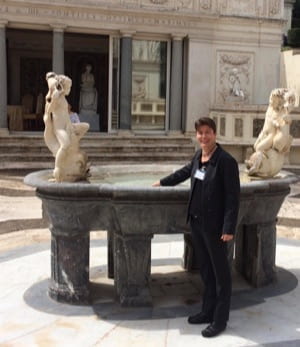
Director Jenny Reardon, with hand in a Vatican fountain, says ‘the Vatican was a stunning backdrop to explore the profound questions of personalized medicine’.
In early April 2019, Reardon, was one of 15 participants invited to participate in a meeting at the Pontifical Academy of Sciences at The Vatican designed to advise the Pope on the future of genomic medicine.
Paying particular attention to how debates about the use of biodata to define ‘race’ are playing out differently in different countries, SJRC researchers followed and contributed to the conversations over the year. In a developing blog was created to serve as a repository for related stories and continues to be regularly updated with new information and new links.
Socio-Ecological Justice
In December 2018, following her 2017-2018 Fulbright Fellowship with SJRC, visiting scholar Lesley Green (Associate Professor of Anthropology in the School of African and Gender Studies, Anthropology and Linguistics; Faculty of Humanities; Director of Environmental Humanities South, University of Cape Town) co-wrote an opinion piece in the Daily Maverick, “Sewage flowing into Kuils River creates a health hazard for all of Cape Town.” The piece explores the microbial and chemical toxicities around the city of Cape Town and their impact on the urban ocean, and incorporates reflections from her time at UC Santa Cruz. Green met with the Mayor of Cape Town to present the teams findings and request his urgent intervention.
In May, a Feminist Science Studies Conference on Indigeneity and Climate Justice, was organized by Professors of Feminist Studies Karen Barad (Science & Justice Director of Teaching) and Felicity Amaya Schaeffer. The conference took as its focus the theme of “Indigeneity and Climate Justice.” A shared concern addressed among the esteemed keynote speakers was the question of how to respond to the challenges and potentials of collaborative engagements between Indigenous and non-Indigenous approaches to caring for the Earth. Participants were invited to engage in conversation about the pressing questions of multiple ontologies, epistemologies, and uneven responsibilities of climate justice as opposed to the more narrow framings of “environmental justice.” Conference details are available at: https://scijust.ucsc.edu/2019/05/30/may30-indigeneity-climate-justice/.

“Participatory modeling and mapping with university researchers has facilitated community members’ collaboration with local leaders on land-use planning to protect sacred forests”. – Melissa Eitzel Solera
Visiting Scholar Melissa Eitzel Solera continued working with SJRC Director Jenny Reardon and Ken Wilson (The Muonde Trust) to wrap up the NSF-funded project, “Understanding Resilience in a Complex Coupled Human-Natural System: Integrating Qualitative and Quantitative Information and Community-Based Action Research.” To report on the results and analysis of the co-created Agent-Based Model of the Muonde Trust’s agro-pastoral system, journal publications were developed for PLoS ONE and Engaging Science, Technology and Society.
Keeping collaborative networks engaged, Eitzel Solera continued to mentor graduate students associated with the Muonde Trust, helping them navigate difficult interdisciplinary landscapes and practical concerns. Eitzel Solera also began initial conversations on Tribal modeling with the Karuk Tribe Department of Natural Resources (KDNR) and researchers at UC Davis in the Working Lands Innovation Center. In November 2018, the work co-created with KDNR and researchers at Stanford, on the Karuk Tribe’s water quality management networks, was presented at the American Anthropological Association annual meeting. In January 2019, Dr. Eitzel Solera participated in a panel on interdisciplinary career trajectories at the UC Davis Conference for Undergraduate Women in Physics. She also continued to support the Diablo California Naturalist team. In learning from their first community-led certification course in which participants discussed citizen science terminology and environmental racism alongside natural history, In May 2019, Eitzel Solera presented on a panel at the Socially Responsible Data Science Day organized by SJRC Affiliate Lise Getoor. The panel sparked a lively discussion of hard questions involving using data in more just ways.
Creating a UCSC Ethics in Practice Curriculum
At an increasing rate, many forms of scientific evidence are met not just with questions of curiosity and interest, but also with skepticism and mistrust. Healthcare systems are challenged by entrenched inequalities and profit motives. Algorithms encode bias into the heart of big data approaches to science and engineering. The next generation of leaders in biomedical and life sciences, environmental science, and engineering need to be adept at addressing these challenges. At SJRC, we believe this requires bold new approaches to ethics and research practice in STEM fields. We strive to exceed narrow standards for the ethical approval of science and prepare our students to be powerful stewards of socially robust and reflexive science. Our vision of good science exceeds simple compliance with institutional mandates, and we work with affiliate faculty to realize this in practice.
 SJRC continues reaching out to principal investigators of training grants to strengthen collaborative graduate training in ethics and justice. Our partnerships with National Institutes of Health T32 training programs at UC Santa Cruz help these efforts. In 2009, the NIH revised their guidance for training in the responsible conduct of research, often referred to as RCR Training, to encourage substantial face-to-face discussions among the participating trainees and a combination of didactic and small-group discussions. As part of T32 training, Director Reardon continues working with Ed Green, Associate Professor of Biomolecular Engineering, who successfully obtained a NIH genomics training grant, to provide ethics training to incoming graduate students in biomedical science and engineering.
SJRC continues reaching out to principal investigators of training grants to strengthen collaborative graduate training in ethics and justice. Our partnerships with National Institutes of Health T32 training programs at UC Santa Cruz help these efforts. In 2009, the NIH revised their guidance for training in the responsible conduct of research, often referred to as RCR Training, to encourage substantial face-to-face discussions among the participating trainees and a combination of didactic and small-group discussions. As part of T32 training, Director Reardon continues working with Ed Green, Associate Professor of Biomolecular Engineering, who successfully obtained a NIH genomics training grant, to provide ethics training to incoming graduate students in biomedical science and engineering.
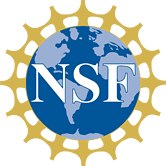
Feedback from other institutions, including the NSF and journal article peer-reviews, indicate that the Science & Justice Training Program has developed a much-needed model for cross-disciplinary training. An ongoing goal of the Center is to create learning models that can be replicated and be applied in academic and non-academic institutions worldwide.
Building off this success, last year, colleagues at UC Davis’s Feminist Research Institute was awarded a grant from the National Science Foundation to develop a program modeled after Science & Justice’s. In April, with UC Davis colleagues, SJRC Director Jenny Reardon with SJRC Director of Teaching Karen Barad received a Center for Information Technology Research in the Interest of Society (CITRIS) grant “Comparative Analysis of Interdisciplinary Training Programs for STEM Scholars” to collect comparative cross-campus data on the two graduate curriculums at UC Santa Cruz and at UC Davis that make questions of gender and social justice fundamental to STEM training. This grant, will enable the hiring of a doctoral student at each campus tasked with ethnographic and observational data collection throughout the duration of the 2019-2020 seminars and analysis of comparative data between the seminars after their completion.
The major research questions being addressed focus on:
- (1) student recognition of societal context for research (potential bias and societal needs),
- (2) a culture of inclusion for those underrepresented in STEM fields,
- (3) interdisciplinary collaborations, and
- (4) the ability to accurately and appropriately use categories in research (e.g. gender, race).
The comparative analysis of the two programs will help demonstrate the efficacy of course-based graduate training in interdisciplinary research and support future expansion of these programs across the UC and beyond. Providing students with the training to recognize and address contextual issues, including biases, SJRC also began working with Cris Hughes (Assistant Clinical Professor,University of Illinois at Urbana-Champaign), who received her PhD from UCSC in anthropology under Alison Galloway (Professor Emerita of Anthropology), to create and coordinate a 1-day workshop recently approved as an accredited continuing education course for California investigators through the state Commission on Peace Officers Standards and Training (P.O.S.T.). The course, as part of Hughes’ residency as a Science & Justice Visiting Scholar, is open to those working in professions where having an up-to-date grasp of genomic technological applications is imperative (eg: police, nurses) and will be first offered in Fall 2019.

As societal and ethical questions are raised at a rapid rate by novel uses of genetics/genomics in forensics work, many, users of ‘recreational’ testing services included, worry that the use of genetic technologies will further sharpen the focus on ethnic/racial groups in the criminal justice system. At the same time, people want to solve horrible cases like that of the Golden Gate killer, in which law enforcement used a DNA ancestry site to identify suspects, a use not anticipated. Creating professional development courses such as this can be used to link the work being done within the university to the practitioners and those directly working in forensics. These broader questions of culture and justice were raised early in the academic careers by these course instructors. An effort sparking to design the S&J Training Program.
After the workshop, an on-campus event with course instructors and forensic technicians will be held to discuss historical and current genomic technological applications field training to better understand the problems and limits of interpretation, the incentives technicians face tied to case resolution and the public versus private resources available to them, and the outcomes of the Forensic Genomics for Investigators workshop.
Reflecting on Our Progress
The 2018-2019 academic year marked the end of our seventh year as a research center. Reflecting on our progress, growth and the challenges ahead, we concluded our multi-year of self-study. This extended self-study and review process allowed us to better understand known institutional and staffing support challenges and make suggestions for change. Refining Center practices, and documenting them in the SJRC Handbook, has allowed the SJRC to better share these practices with our affiliates. Refer to Appendix 7 for a report of our findings.
With the SJRC Assistant Director position now vacated and funding re-distributed, we updated and streamlined our leadership structure moving appropriate duties from the position to a Director of Teaching and a Director of Research to be filled by available and interested tenure track faculty. We also expanded administrative items taken on by the center administrative staff. In Fall, SJRC received approval for the administrative assistant position to transform to a program manager position. In her new role as Center Manager, Colleen Stone met with Director Jenny Reardon and Sociology Department Manager Jessica Lawrence to better understand and delineate responsibilities of administrative tasks related to running the Center, and when and where the Center can ask for support from the Department or from the Social Sciences Division. From Lawrence, Stone began learning how to use the DivData academic personnel system to process courtesy and lecturer appointments, and will begin assuming the responsibility of processing future appointments. In Winter, SJRC received approval to appoint Karen Barad as the Director of Teaching for the Science & Justice Training Program.
Based on the research we conducted in the self-study and feedback we received through the TAWG (Themed Academic Working Group) process, we updated and revised the process of faculty affiliation to focus on how the Center can provide effective support to the educational and research efforts of our diverse faculty community. We also began working with the School of Engineering and the Genomics Institute to envision specific ways in which SJRC and SOE faculty and students can engage.
Looking Ahead
The SJRC has become a dynamic and collaborative infrastructure for training the next generation of humanities, natural and social science researchers who will still be trained and supported to pursue their research and make discoveries, but will do so in purposeful ecosystems where ethics and justice are primary concerns.
As campus administrative and academic leadership shifts, the Center and its affiliated faculty continue to be key partners in forming responses to the future of training, curriculum, and research across campus and as a part of strategic academic planning. As appropriate, Center programming and collaborative research connects to the three priority areas – Earth Futures, Justice in a Changing World, and Digital Interventions.
In 2019-2020, SJRC looks forward to formally inviting new faculty to affiliate with the Center, appointing a Director of Teaching, and welcoming a new cohort of Training Program graduate fellows.
In November 2019, SJRC Advisor Kim TallBear (UCSC HistCon, Associate Professor, Faculty of Native Studies, University of Alberta, and Canada Research Chair in Indigenous Peoples, Technoscience & Environment) will visit campus with UofA colleague, Assistant Professor Jessica Kolopenuk, to discuss the SJRC Training Program and potential grant opportunities with SJRC to develop a similar program at the University of Alberta. Over the past two years, they have co-developed an Indigenous Science, Technology, and Society Research hub and Training Program (www.IndigenousSTS.com) at the University of Alberta.
Celebrating its 10-year anniversary, Science and Justice: Experiments in Collaboration, the introductory course to the Science & Justice Training Program, will be offered during the Winter 2020 term and will be taught by Professor of Sociology and SJRC Director, Jenny Reardon. With UC Davis, we look forward to beginning our cross-campus CITRIS study “Comparative Analysis of Interdisciplinary Training Programs for STEM Scholars” to collect comparative data on our graduate curriculum that make questions of gender and justice fundamental to STEM training.
As we look to the future, we seek to continue to build SJRC as a hub for extramural funding of research projects with links to science and justice. We are committed to developing future research collaborations, and seek collaborators from all divisions and the UC system, and community. We will continue to provide a critical and dynamic space for the intellectual, organizational and moral support of the diverse needs of our faculty, researchers, students, and staff.
Funding the Future of Science & Justice
Director Jenny Reardon and Manager Colleen Stone continued to work closely with University Relations and Development Officers to develop strategies for funding the future of science and justice at UC Santa Cruz. We developed case statements and concrete fundraising goals for the research center and for the graduate training program. Our immediate grant-writing and fundraising goals include fellowship support for the Science & Justice Training Program graduate fellows, and support for Center staff and faculty. With the support of the SJRC Steering Committee, we will continue to pursue grants to support the Center’s collaborative research, training and advocacy activities.
 Director Reardon continues to follow up on several meetings that emerged from the successful March 2018 book launch in New York, hosted not only to celebrate Reardon’s The Postgenomic Condition’s launch, but also to gather a new audience in New York of alumni, scholars, and professionals interested in supporting the work of UC Santa Cruz and the Science & Justice Research Center. Now in the second of a three-year gift to support, Reardon continues to work closely with a 2018 donor on institutional accountability and the accessibility of cutting edge biomedical research.
Director Reardon continues to follow up on several meetings that emerged from the successful March 2018 book launch in New York, hosted not only to celebrate Reardon’s The Postgenomic Condition’s launch, but also to gather a new audience in New York of alumni, scholars, and professionals interested in supporting the work of UC Santa Cruz and the Science & Justice Research Center. Now in the second of a three-year gift to support, Reardon continues to work closely with a 2018 donor on institutional accountability and the accessibility of cutting edge biomedical research.
In February, we participated again in creating a campaign for UCSC’s annual Giving Day.
Additional grant funding and donor contributions will secure our efforts to build an internationally recognized program that trains the next generation of scholars to responsibly take up the important social and scientific problems of our time. Higher lever grant writing and long-term program coordination will help us to develop our research infrastructure and ability to obtain large-scale grants. As the Center prepares to seek funding to support the re-structured Center, we hope to spread current campus commitments more evenly among units and divisions to holistically support the Center.
Our ambitious fundraising goals and sustained efforts to pursue grant and foundation funding will continue the growth and vitality of our work and community.
SJRC’s promise is simple and bold.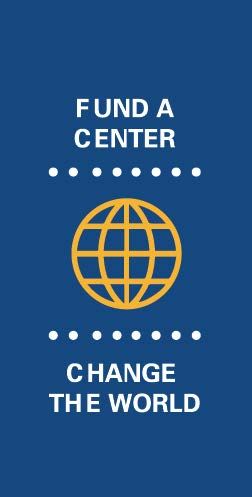
The benefits are manifold: improved outcomes not just for humans, but for the many non-human lives as well; approaches to science and technology that balance prosperity and justice, health, ecological survival and ethics. Our affiliated researchers and interdisciplinary teams have built decades of scholastic expertise examining the life sciences and biomedicine, health, environment, food, and racial and economic justice. The Center provides the critical milieu in which the creative sharing of this expertise leads to novel justice praxis and knowledge sharing that fosters and supports diverse lives and futures.
Thank you for making a more just world possible!
Appendix 1: Visiting Scholars
2018-2019
Melissa Eitzel Solera a National Science Foundation Postdoctoral Science, Engineering and Education for Sustainability Fellow (through Fall 2020)
Joseph Klett a Research Fellow, Science History Institute (formerly Chemical Heritage Foundation)
Karina Rider | PhD Candidate, Sociology, Queen’s University (Ontario, Canada) (starting Spring 2019)
Iris Yellum | PhD Candidate, South Asian Studies, Harvard University (Fall 2019, Winter 2020)
2019-2020
Melissa Eitzel Solera | National Science Foundation Postdoctoral Science, Engineering and Education for Sustainability Fellow, Sociology (through Fall 2020)
Iben Gjødsbøl | Fulbright Fellow, Assistant Professor at the Centre for Medical Science and Technology Studies, Department of Public Health, University of Copenhagen, Denmark (Winter 2020)
Cris Hughes | Assistant Clinical Professor of Anthropology, University of Illinois at Urbana-Champaign (Fall 2019)
Joseph Klett | Research Fellow, Science History Institute (through Spring 2020)
Karina Rider | PhD Candidate, Sociology, Queen’s University (Ontario, Canada) (through Fall 2019)
Iris Yellum | PhD Candidate, South Asian Studies, Harvard University (Fall 2019, Winter 2020)
Appendix 2: Science & Justice Working Group (SJWG) Events, Experimental Mixers, and Reading Groups
Works-in-Progress with Lindsey Dillon
SJRC scholars read Assistant Professor of Sociology, Lindsey Dillon’s Hastings Environmental Law Journal article The Breathers of Bayview Hill: Redevelopment and Environmental Justice in Southeast San Francisco and on November 14th, gathered in the SJRC Common Room to listen to Dillon discuss her research on redevelopment and racial capitalism in San Francisco.
Algorithms, Mobility, and Justice
Are moral algorithms a reasonable solution for taking advantage of life-saving potentials of self-driving cars? On November 28th, the Science & Justice Working Group convened to discuss just that. Nassim JafariNaimi (Assistant Professor, Georgia Institute of Technology) engaged the utilitarian framings that are dominant in the discourses on self-driving cars inclusive of the assumptions that are folded into the question above: that algorithms can be moral and self-driving cars will save lives. Drawing on feminist and care ethics, the discussion brought to fore the injustices built into current and future mobility systems such as laws and policies that protect car manufacturers and algorithmic biases that will have disproportionate negative impacts on the most vulnerable. Moreover, it was argued that a constricted moral imagination dominated by the reductive scenarios of the Trolley Problems is impairing design imagination of alternative futures. More specifically, that a genuine caring concern for the many lives lost in car accidents now and in the future—a concern that transcends false binary trade-offs and that recognizes the systemic biases and power structures—could serve as a starting point to rethink mobility, as it connects to the design of cities, the well-being of communities, and the future of the planet. The SJWG was convened by affiliate Neda Atanasoski (UCSC Professor of Feminist Studies and Director of Critical Race and Ethnic Studies) while Abhradeep Guha Thakurta (UCSC Assistant Professor of Computer Science and Engineering) offered a response and comments. The rapporteur report can be found at: https://scijust.ucsc.edu/2018/11/28/algorithms-mobility-justice/.
Theorizing Race After Race
Science & Justice scholars gathered a number of times throughout the year for open discussions to theorize the meanings of race. First, on November 28th in Engineering 2, room 599, again on January 15th in the SJRC Common Room. On April 16th we discussed submitting an application for SSRCs Scholarly Borderlands program to continue the work of the group and support the development of some related projects. On May 7th, we returned to the NYT article about Reich with the implications of ancient DNA research for contemporary contestations over the category “race” with Lars Fehren-Schmitz and juxtaposed the Reich article with the 2018 special issue of Kalfou, “Symposium on Race and Science” by James Doucet-Battle.
Works-in-Progress with Karen Barad
On February 27th, SJRC scholars gathered in the SJRC Common Room to listen to Professor of Feminist Studies Karen Barad discuss her research on matters of force, entangled nuclear colonialisms, quantum temporalities, and the otherwise of being.
Visiting Scholar Roundtable
On April 17th, Science & Justice welcomed Karina Rider (Sociology Graduate Student at Queen’s University, Canada) to the community. As Rider moves into the second round of fieldwork, the S&J community was invited to help identify which areas of her first round of ethnographic work on civic action targeting the internet and the defining of data justice (specifically within the context of racialized institutions and processes – such as education, housing, transit, and resource distribution) in Silicon Valley were most promising for analysis. One of Karina’s goals for her visit is to develop a conceptual toolkit for thinking about the relationships between materiality, ideas, and action – an important contribution to our programs including the Seeing Like a Valley Initiative.
Works-in-Progress with Jenny Reardon
On May 1st, we listened to Professor of Sociology and SJRC Center Director, Jenny Reardon discuss her ongoing research involving biking through the prairies and small towns of Kansas. As she explained in the podcast launching of The Sociological Review, this is a project that was designed to develop embodied knowledge of the land and to find out more about attitudes towards contemporary US politics from the denizens of the prairies. By talking about how to know and care for the land with her interlocutors, Reardon uncovers, layer by layer the interlocking effects of globalization, financialization and environmental change on how they live their lives.
Hallam Stevens on the Starting-up of Biology
On May 2nd, SJRC co-hosted a discussion and lunch with the UC Santa Cruz Genomics Institute on The BGI group, one of the world’s largest and most successful genomics companies based in Shenzhen, China. As most commentaries on BGI have focused, quite narrowly, on the organization’s ambitions for scaling-up biology into a high-throughput production line, Hallam Stevens re-situated BGI’s laboratories and work within the local economic, social, political, and urban contexts within which it exists by drawing on ethnography, performance studies, and urban studies. Hallam Stevens is a leading scholar of the ethics and social studies of bio information; Associate Professor in the History Programme and in the School of Biological Sciences at Nanyang Technological University in Singapore and the Associate Director (Academic) of the NTU Institute of Science and Technology for Humanity where he teaches classes on genomics, the life sciences, big data, and the history of computers as well as on food history and history of science and technology more generally.
Works-in-Progress with James Doucet-Battle
On May 8th we heard from Assistant Professor of Sociology, James Doucet-Battle discuss his book project entitled, Recruiting Sweetness: Translating Race, Risk, and Gender in Type 2 Diabetes Research, that explores the knowledge production emerging from the increasing importance of biological and racial differences in diabetes research since the genomic revolution.
Appendix 3: Research Clusters & Projects
Just Biomedicine
Just Biomedicine is a UC Santa Cruz-based research collective that examines the meeting of biomedicine, biotechnology, and big data along the Third Street corridor in the Mission-Bay neighborhood of San Francisco. Many hope that this convergence will democratize access to health information and produce revolutionary new medical treatments that new companies will make available to the public through market mechanisms. Yet, as in other domains, living with technoscientific transformations over time reveals how they produce new inequalities and injustices: new challenges to democratic governance; new surveillance regimes; and new forms of social stratification.
Jail / Care: Amplifying Santa Cruz Community Voices on Health & Incarceration
The project is investigating the conditions of health care in the Santa Cruz County jails. After a series of preventable deaths in the local jail, concern has arisen in the community regarding the quality and accessibility of health care in Santa Cruz jails. This project will document health care in the Santa Cruz jail, using the methodologies and perspectives of research team members in the Sociology, Film and Digital Media, and Psychology departments, as well as community organization Sin Barras.
Queer Ecologies Research Cluster
Queer Ecologies is a reading group led by Training Program Fellow Paloma Medina. It meets every other week to investigate how sexuality and concepts of nature have been historically linked. In particular, they are interested in how evolutionary and ecological science has informed what is “natural” and how we use this information to delineate certain sexual behaviors as normal or aberrant. Queer Ecologies seeks to examine the historical making of the natural as it relates to sexuality while communicating the overwhelming diversity of sex and gender in biology. Member, Raed Rafei, a UCSC PhD student in Film and Digital Media is working with Helem, an LGBTQ-rights organization based in Lebanon, making a documentary film, called “On the Natural.” The film will question the concept of “natural” in Raed’s hometown of Tripoli, Lebanon, where homosexuality is criminalized as an act against “the order of nature.” Raed is funded as a 2018 Human Rights Center Fellow. For more information on this cluster, visit the Queer Ecology webpage or contact Paloma Medina.
Telling the Truth: Objectivity & Justice Research Cluster
While the Objectivity & Justice cluster did not meet during the 2018-2019 academic year, since the inauguration of the 2016 U.S. presidential election, Science & Justice researchers continued to critically examine what the terms fact, truth, and reality signal to each of us in relation to our own research and disciplines. At the same time that it is of utmost importance that facts, truth, and reality be asserted to counter the normalization of lies and fake news used to obscure the truth and manipulate the public, large bodies of scholarship showing the non-innocent and often times harmful use of these terms in ways that collude with the forces of power, including colonialism, racism, militarism, etc. We anticipate that these terms will spark a variety of different associations depending on our fields of study and warmly welcome undergraduates, graduates, and faculty. The Telling the Truth Cluster is convened by SJRC Steering Committee Member and Co-Director of the SJTP Karen Barad.
Theorizing Race after Race
In the post-WWII, post-fascist, post-nationalist moment, a dominant story developed both within and outside the academy that ‘race’ had no meaning or value for understanding human biology. Despite the so-called end of ‘race’ over the last several decades, scholars continued to track the subtle manner in which racial thinking continued under the cover of culture, religion, population and ethnicity. Today, however we see an overt return to race, a return facilitated and mediated by novel forms of science and technology: genomics; machine learning; algorithmically driven media platforms. From David Reich’s New York Times op-ed arguing that there is a genetic basis to ‘race,’ to renewed interest in Charles Murray and The Bell Curve, several prominent public intellectuals have sought to buck what they perceive as the ‘politically correct dogma’ of race as a social construction. At the same time, members of the alt-right are embracing genomics research to support their claims for a ‘white ethnostate.’ ‘Theorizing Race after Race’ seeks to develop a framework for grappling with these reconfigurations of race after the supposedly ‘post-racial’ moment. Our goal is to understand how knowledge of the genome and ideas of human difference circulate, taking on different meanings across diverse historical-geographical contests. The Theorizing Race after Race Cluster is convened by Camilla Hawthorne (Sociology) and Jenny Reardon (Sociology).
Appendix 4: SJRC Publications and Awards
Politics undergraduate Wessede Barrett and Feminist Studies undergraduate Nikobi Petronelli were awarded for their work on Just Biomedicine. And Roxy Davis for her work on Jail/Care. Interviews were coordinated and conducted by Psychology Graduate Student Roxy Davis (funded by the Blum Center), and focused on experiences from those who received health care or services directly from inside the local jail.
A grant from The Association for the Study of Food and Society was awarded to supported the SJTP critical studies event. In an interview with the association, Zurawski discussed her work in food justice and colonization, as well as her transdisciplinary work as part of Science & Justice at UC Santa Cruz.
Science & Justice Affiliate, UC Santa Cruz Professor of History, Jennifer L. Derr, follows the engineers, capitalists, political authorities, and laborers who built a new Nile River through the nineteenth and early twentieth centuries. The river helped to shape the future of technocratic knowledge, and the bodies of those who inhabited rural communities were transformed through the environmental intimacies of their daily lives. More on the book can be found at: https://scijust.ucsc.edu/2019/07/01/derr-lived-nile/.
SJRC Advisor and Professor Emeritus of Sociology Herman Gray’s new book Racism Postrace (Duke Press, 2019) examines the concept of postrace and its powerful history and allure, showing how proclamations of a postracial society further normalize racism and obscure structural antiblackness.
More on the book and introduction can be found at: https://scijust.ucsc.edu/2019/05/28/book-gray-racism-postrace/.
In her new book, “Wilted: Pathogens, Chemicals, and the Fragile Future of the Strawberry Industry (UC Press, 2019)”, Science & Justice Affiliate, UC Santa Cruz Professor of Social Sciences Julie Guthman tells the story of how the strawberry industry came to rely on soil fumigants, and how that reliance reverberated throughout the rest of the fruit’s production system. The particular conditions of plants, soils, chemicals, climate, and laboring bodies that once made strawberry production so lucrative in the Golden State have now changed and become a set of related threats that jeopardize the future of the industry. Find out more on what Guthman has to say about the strawberry production regions in California in this campus news article: Strawberries: The tasty fruit with a tainted environmental legacy and an uncertain future.
In, The Software Arts (MIT Press, 2019) SJRC Affiliate, Chair and Professor of Film and Digital Media Warren Sack provides an alternative history of software that places the liberal arts at the very center of software’s evolution, Sack invites artists and humanists to see how their ideas are at the root of software and invites computer scientists to envision themselves as artists and humanists.
Sack translates concepts and categories from the liberal and mechanical arts—including logic, rhetoric, grammar, learning, algorithm, language, and simulation—into terms of computer science and then considers their further translation into popular culture, where they circulate as forms of digital life. An interview with Sack and campus news-writers and is available at: https://news.ucsc.edu/2019/08/sack-software-arts.html.
Under increasingly intense newsroom demands, reporters often find it difficult to cover the complexity of topics that deal with racial and social inequality. This path-breaking book by S&J Visiting Scholar Sally Lehrman, lays out simple, effective reporting strategies that equip journalists to investigate disparity’s root causes. Chapters discuss how racially disparate outcomes in health, education, wealth/income, housing, and the criminal justice system are often the result of inequity in opportunity and also provide theoretical frameworks for understanding the roots of racial inequity.
More on the book can be found at: https://scijust.ucsc.edu/2019/04/18/lehrman-book-reporting-inequality/
Appendix 5: SJRC Funders
Grants
SEES Fellows: Understanding Resilience in a Complex Coupled Human-Natural System: Integrating Qualitative and Quantitative Information and Community-Based Action Research
Funding Agency: National Science Foundation
Principal Investigator: Jenny Reardon (for SJRC Postdoc Melissa Eitzel Solera)
NSF Award No: 1415130; 2014-12/31/2020
Amount: $520,412
National Institutes of Health T32 Training Program
Funding Agency: National Institute of Health
Principal Investigator: Ed Green (Biomolecular Engineering)
-
- Renewal also submitted; total requested $1,908,050.00
- UC Santa Cruz Training Program in Genomic Sciences; 06/01/2020 – 05/31/2025
Engineering Research Center for Convergent Genomics
Funding Agency: National Science Foundation
Co-Principal Investigator: Jenny Reardon
NSF Award No: EEC-1840470. June 2018-September 2019
Award Amount: $100,000
Major Donors
Robb Mass with GS Gives
Major Sponsors
Department of Sociology
Division of Graduate Studies
Division of Humanities
Division of Physical & Biological Sciences
Division of Social Sciences
SJWG Event Co-Sponsors
The Association for the Study of Food and Society
The Center for Analytical Finance
The Center for Cultural Studies
The Center for Data, Discovery and Decisions (D3)
College Nine
College Nine Student Senate
College Ten
Community Studies Program
Critical Race and Ethnic Studies
Department of Anthropology
Department of Biomolecular Engineering
Department of Education
Department of Environmental Studies
Department of Feminist Studies
Department of Molecular, Cell, and Developmental Biology
Department of Philosophy
Department of Sociology
The UC Santa Cruz Genomics Institute
The UC Santa Cruz Genomics Institute Office of Diversity (formerly the Research Mentoring Institute)
The UC Santa Cruz Institute for Social Transformation
History of Consciousness Program
The Humanities Institute
The Humanities Institute’s Data and Democracy Initiative
Kresge College
Kresge College’s Media & Society Seminar Series
Oakes College Student Senate
The School of Engineering NIH Training Grant
The Stuart Lab
Major SJRC Co-Sponsored Events
May 30-31, 2019 | Indigeneity and Climate Justice
Appendix 6: SJRC Self-Study Findings & Proposed Responses
Overview
Founded in 2006, The Science & Justice Research Center at the University of California, Santa Cruz is a globally unique endeavor that innovates experimental spaces, engages in co-laborative research practices, and fosters emerging alliances between seemingly disparate sectors, disciplines and communities. Biomedical innovation, species extinction, toxic ecologies, healthcare reform, and many other contemporary matters of concern provoke questions that traverse multiple intellectual, institutional and ethico-political worlds. Science & Justice generates modes of inquiry and empirically rigorous research that address these enormous challenges and support livable worlds. The Center is home to the Science & Justice Working Group, the Science & Justice Training Program and sponsored research projects. The initiative builds on the UCSC campus’ historic commitments to socioecological justice and strengths in science studies and interdisciplinary research.
The Center organizes transdivisional research projects, meetings and events. In addition, the SJRC hosts a graduate research seminar entitled Experiments in Collaboration which is cross-listed with Anthropology, Biomolecular Engineering, Feminist Studies, and Sociology, and is the gateway course to the Science & Justice Training Program (SJTP). The SJTP started in 2010 with a grant from the National Science Foundation, and has since taught 80 graduate students, 2 undergraduate students, awarded 33 fellowships, and 41 certificates. The program is a nationally and internationally recognized effort to train the next generation of researchers to maximize the public good of science and technology.
Our work has been covered in lead journals both in the natural and social sciences and in the popular press (see Appendix 8 SJRC Key Accomplishments). Science & Justice also has established itself as an innovative leader creating transdisciplinary teaching and research that other academic institutions both within and outside the United States model. Our co-laborative research partners span both the campus and the globe, from the United Kingdom, Belgium, South Africa, Colombia, Canada and Mexico (refer to our International Research Collaborations).
SJRC also has helped to secure several large grants from the NIH (e.g. training grants secured by Susan Strome, Ed Green and Beth Shapiro), as well as nearly a million-dollar worth of our own grants from the National Science Foundation and the University of California Office of the President.
The SJRC Self Study
The self-study offered us a chance to reflect on the last six years of growth and development, to articulate our challenges and strengths and to propose a route forward. Our self-study was conducted by our Steering Committee with the advisement of our Advisory Board (see Appendix 8 for affiliates). Over the course of three years, we conducted interviews with other centers and institutions (both on and off campus), talked frequently with administration to better understand workflow and staffing between coordinating units, and met quarterly with our committees exploring the following. Below is a summary of our efforts and findings.
Challenges and Proposed Responses
SJRC Center Organization: In response to the growth of Science & Justice, in Fall 2015, the Center hired its first Assistant Director. In the subsequent years, the SJRC ADs have done much to develop SJRC research and training. Understandably, however, the top scholars we have recruited have sought–and secured–tenure track positions. Thus, there has been a lot of turnover, creating instability for the Center. For this reason, as well as to increase faculty involvement, we decided to end the Assistant Director position, and to instead create a Director of Research and Director of Teaching position that would be supported by one course release each, and increase support for the Director to one course release and summer funding (that would compensate for previously uncompensated direction of the Center over the summer). We also decided to re-classify our administrative assistant from a “Blank Assistant III” to an “Administrative Officer III” as a center manager (refer to Appendix 7 SJRC 2018-2019 Org Chart). In the 2018-19 academic year, we successfully reclassified the AA to a center manager and were able to support our first Director of Teaching (Karen Barad). This greatly improved the Center functioning. Barad oversaw the completion of the projects of eight SJRC graduate fellow projects, and helped to secure a grant from CITRIS to support the SJTP. Massengale was able to take on more complex administrative tasks.
Research Development: The SJRC is regularly asked to participate in national and transnational research efforts, most recently with UC Davis, University of Alberta, Harvard University, and the University of Sussex. Unfortunately, due to limited faculty or staff time for working on developing research or curriculum, we have not been able to respond to all of these requests. To address this challenge, we decided to create a Director of Research who will work with the Executive Director to develop, manage and direct research projects (see Appendix 9 SJRC Key Accomplishments). To date, we have not yet been able to appoint someone to this position due to lack of funds.
Funding SJRC: Historically Science & Justice has worked across the university asking for financial support from all divisions, although Social Sciences carried most of the burden. In early Fall 2018, we began asking campus divisions to provide equal commitments towards operating costs. To date, we have received three-year commitments of support from the Division of Humanities and Physical and Biological Sciences, the Graduate Division, the Genomics Institute (pending funding of the GI), and two years of support from the Division of Social Sciences (refer to Appendix 10 SJRC Committed and Requested Funding). We are also in dialogue with the School of Engineering, who have expressed interest in working with the SJRC and providing financial support.
In 2018 we secured our first major donation, a measure of our potential in this area, a multi-year donation from a private donor pledging to support summer fellowships for SJRC graduate student projects. Our main current philanthropic goal is to endow the Science & Justice Training Program Graduate Fellows. SJRC continues to work with University Relations to identify funders that might sponsor student summer research on ethics and justice in scientific practice.
Conclusion
In the Appendices below, you will find key information about the new organization of the Center, our key accomplishments, our collaborators and affiliates, as well as our committed and requested funding.
Appendix 7: SJRC 2018-2019 Org Chart
SJRC Org Chart 2018-2019 (PDF)
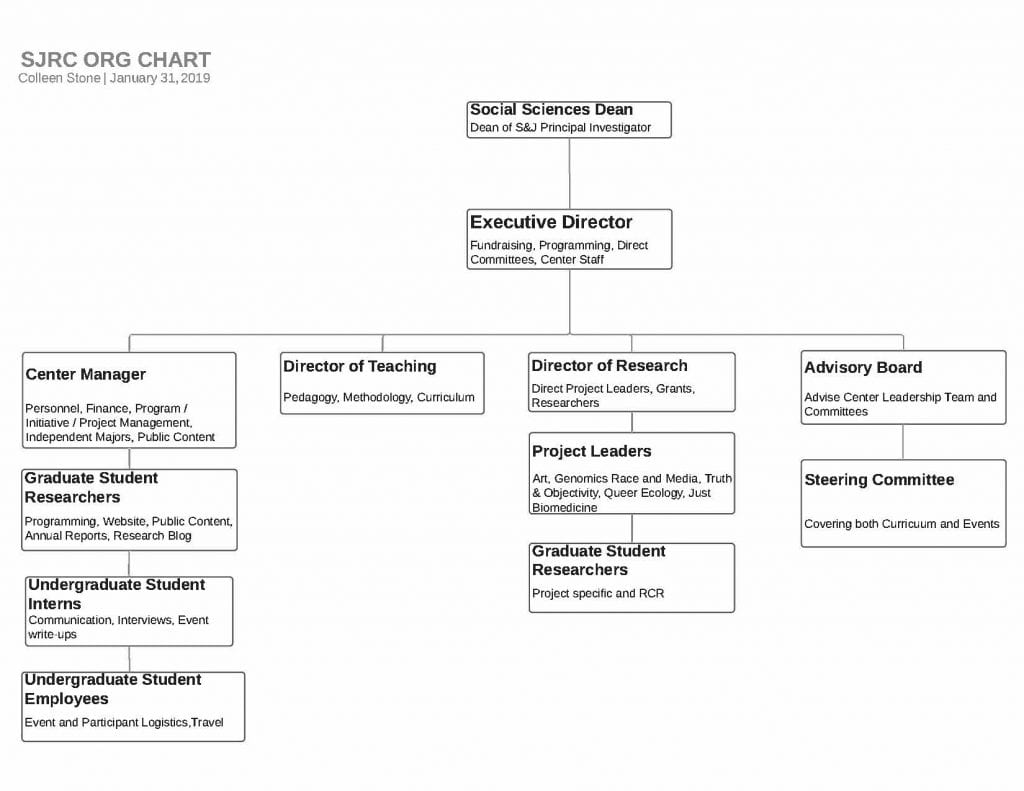 Appendix 8: SJRC Faculty Affiliates at UC Santa Cruz
Appendix 8: SJRC Faculty Affiliates at UC Santa Cruz
SJRC partners with regional and international units to provide a discipline neutral space to freely express and address areas of shared concern through facilitated discussions, student exchanges, research, and training.
SJRC Executive Director
Jenny Reardon, Sociology
SJRC Director of Teaching
Karen Barad, Feminist Studies, History of Consciousness, and Philosophy
SJRC Steering Committee
Karen Barad, Feminist Studies, History of Consciousness, and Philosophy
Lindsey Dillon, Sociology
James Doucet-Battle, Sociology
Jenny Reardon, Sociology
SJRC Internal Advisory Board
Elliot Anderson, Art
Nancy Chen, Anthropology
Ben Crow, Sociology
Herman Gray, Sociology
Ed Green, Biomolecular Engineering
Zia Isola, Center for Biomolecular Science & Engineering
Sally Lehrman, SJRC Visiting Professor
Warren Sack, Digital Arts & New Media
Susan Strome, Molecular Cell & Developmental Biology
Anna Tsing, Anthropology
John Weber, Institute for Arts and Science
UCSC Affiliated Faculty
Neel Ahuja, Feminist Studies
Elliot Anderson, Art
Hillary Angelo, Sociology
Neda Atanasoski, Feminist Studies
Karen Barad, Feminist Studies, History of Consciousness, and Philosophy
Chris Benner, Environmental Studies, Sociology
Micha Cárdenas, Art & Design: Games & Playable Media
Nancy Chen, Anthropology
Sharon Daniel, Film and Digital Media
Jennifer Derr, History
Lindsey Dillon, Sociology
James Doucet-Battle, Sociology
Madeleine Fairbairn, Environmental Studies
Lise Getoor, Computer Science
Herman Gray, Sociology
Julie Guthman, Community Studies
Camilla Hawthorne, Sociology
Dee Hibbert-Jones, Digital Art and New Media
Zia Isola, Center for Biomolecular Science & Engineering
Andrew Mathews, Anthropology
Jennifer Parker, Art; Open Lab Research Center
Maya Peterson, History
Jenny Reardon, Sociology
Warren Sack, Digital Arts and New Media
Beth Shapiro, Ecology and Evolutionary Biology
Matt Sparke, Politics
Beth Stephens, Art, E.A.R.T.H. Lab
Susan Strome, Molecular Cell & Developmental Biology
Anna Tsing, Anthropology
John Weber, Institute of the Arts and Sciences
Jerry Zee, Anthropology
Appendix 9: SJRC Key Accomplishments
External Funding
In the summer of 2004, The National Science Foundation awarded the Science & Justice Research Center $5000 in support of the SJRC Genomics and Justice Meeting “Paradoxes of Participation: The Status of ‘Groups’ in Liberal Democracies in an Age of Genomics” (NSF Award No: 0351475; Award Period: 6/1/2004-12/31/2008. Total Award Amount: $120,000). And in Fall 2007, SJRC was granted another NSF grant for the “Genomics, Governance and Tribes: A Workshop” (NSF Award No: NCS0002; Award Period: 8/1/07-12/31/09. Award Amount: $24,972).
 In the Fall of 2009, NSF funded the launch of the Science & Justice Training Program (SJTP) (NSF Award No: SES-0933027). In the decade since, the SJTP has become a model for how to do transdisciplinary, collaborative research, inspiring the creation of other similar programs, including the recently launched NSF IGE-Interdisciplinary Training Program in Cultural Values for STEM Scholars at UC Davis. Funding from the NSF also launched the Center’s Just Data research focus (“Open Data/Private Persons: Forging a New Social Contract for Biomedicine in an Age of Genomics and Big Data”; NSF Award No: SES-1451684). Science & Justice Postdoctoral Fellow Melissa Eitzel was funded by an NSF SEES Fellowship (Understanding Resilience in a Complex Coupled Human-Natural System: Integrating Qualitative and Quantitative Information and Community-Based Action Research; NSF Award No: SMA-1415130).
In the Fall of 2009, NSF funded the launch of the Science & Justice Training Program (SJTP) (NSF Award No: SES-0933027). In the decade since, the SJTP has become a model for how to do transdisciplinary, collaborative research, inspiring the creation of other similar programs, including the recently launched NSF IGE-Interdisciplinary Training Program in Cultural Values for STEM Scholars at UC Davis. Funding from the NSF also launched the Center’s Just Data research focus (“Open Data/Private Persons: Forging a New Social Contract for Biomedicine in an Age of Genomics and Big Data”; NSF Award No: SES-1451684). Science & Justice Postdoctoral Fellow Melissa Eitzel was funded by an NSF SEES Fellowship (Understanding Resilience in a Complex Coupled Human-Natural System: Integrating Qualitative and Quantitative Information and Community-Based Action Research; NSF Award No: SMA-1415130).
The Center was awarded a grant through the University of California Multi-Campus Research Program for the UC North Bioethics Collaboratory for Life and Health Sciences to build UC’s strength in bioethics training and research. The SJTP served as a model for the cross-disciplinary, cross-campus training the Collaboratory sought to build. In 2019 the Center was awarded a grant through the CITRIS and Banatao Institute to participate in a cross-campus comparison of two STEM graduate curriculums (the SJTP at UC Santa Cruz and at UC Davis) that make questions of gender and social justice fundamental to STEM training; (Comparative Analysis of Interdisciplinary Training Programs for STEM Scholars. Award Period: April 1, 2019 – June 30, 2020. Award Amount: $40,947 (UCSC Subaward amount: $20,473.50).
Finally, University of California President’s Postdoctoral Fellows program funded three fellows whose research homes were in Science & Justice, two of whom became tenure-track professors at UC Santa Cruz.
The amounts and kinds of funding are summarized.
Science & Justice Training Program
Upon establishment of the Science & Justice Training Program Certificate in 2013, SJRC has issued 41 certificates (expected S’19) in recognition to graduate students who have developed collaborative research methods for exploring the meeting of questions of science and knowledge with questions of ethics and justice.
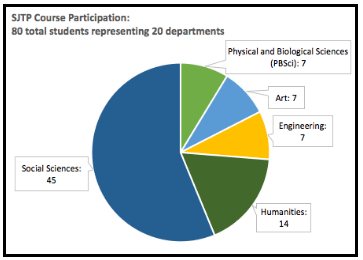 SJRC together with science and engineering departments and programs on campus organize expanded scientific ethics and professional practice training for graduate students. Our innovative approach has fostered direct collaborations with several faculty PI’s including Beth Shapiro (Ecology and Evolutionary Biology and HHMI Investigator), Susan Strome (Distinguished Professor of Molecular, Cell and Developmental Biology) and Ed Green (Assistant Professor of Molecular Engineering), who successfully received a National Institute for Health grant (2015-2020 for a total of $2,567,971) for a genomics training program for incoming graduate students in biomedical science and engineering that includes a Science & Justice training component.
SJRC together with science and engineering departments and programs on campus organize expanded scientific ethics and professional practice training for graduate students. Our innovative approach has fostered direct collaborations with several faculty PI’s including Beth Shapiro (Ecology and Evolutionary Biology and HHMI Investigator), Susan Strome (Distinguished Professor of Molecular, Cell and Developmental Biology) and Ed Green (Assistant Professor of Molecular Engineering), who successfully received a National Institute for Health grant (2015-2020 for a total of $2,567,971) for a genomics training program for incoming graduate students in biomedical science and engineering that includes a Science & Justice training component.
Through its original training grant “Ethics and Justice in Science and Engineering Training Grant” (NSF Award No SES-0933027; Award Period: 2009-2013; Award Amount: $300,000; Supplemental Award Amount: $15,000) issued by the National Science Foundation, the Science & Justice Training Program issued 27 fellowships supporting students for one term and provided summer research funds, extensive mentoring and support for public programming related to their projects.
Through extramural fundraising, the Center secured a $25,000 gift (distributed over 3 years) from a private donor. Summer 2019, 5 fellowships will be given for students conducting research.
Our students have founded consulting firms, teach at tenure-track universities, write for science communication organizations, and one became the sustainability and climate action manager for the City of Santa Cruz who discusses options for locals dealing with rising sea levels at Citizen Science presentations.
Press Coverage and Publications
One of the goals of the Science & Justice community is to produce and support original research. Select publications are listed below:
- Gigascience | Bermuda 2.0 Reflections from Santa Cruz
- Science & Justice: The Trouble and the Promise
- PLOS Biology | Experiments in Collaboration: Interdisciplinary Graduate Education in Science and Justice
- STHV | On the Emergence of Science and Justice
- Genomics and Justice: Promises and Perils in the Pursuit of Responsible Science
SJRC often appears in press in the form of op-eds, coverage of event programming, and interviews about Center practices and methodologies.
- SJTP Fellow Erica Zurawski’s interview with the Association for the Study of Food and Society. 26 April 2019.
- SJRC Director Reardon’s interview by Le Monde. 11 January 2016.
- SJRC Director Reardon’s op-ed, “Should Patients Know They Are Research Subjects?” San Francisco Chronicle. 3 March 2013.
- SJRC was interviewed by Danish Education Abroad Program student Bue Thastum “Should Research Create a Better World.” Danish Daily Information. Sept. 2013. n. pag. Web. 26 Sept. 2013.
SJRC is often looked at as an exemplar in interdisciplinarity programing and research.
- 2015-16 Inquiry Research Magazine – pg 19-21
- Mueller, Ruth and Kenney, Martha. “Agential Conversations. On Interviewing Life Scientists and the Politics of Mundane Research Practices.” Science as Culture 23. (2014)
- Andrade et al. “Finding your way in the interdisciplinary forest notes on educating future conservation practitioners.” Research Gate (2014) (pg 14 mentions the work but not the Center)
- McCabe, Daniel. “The Slow Science Movement”. University Affairs. (2012) (mentions the Center in the comments)
SJRC also publishes annual year end reports detailing its programmatic activities (2017-18) and newsletters that include updates on community happenings. Please visit the Center’s website for a complete list of publications and reports.
Critical Research Collaborations
In addition to working with faculty and students across all campus divisions, SJRC partners with multiple local, regional, and international units to provide a discipline neutral space to freely express and address areas of common concern through facilitated discussions, student exchanges, research, and training.
SJRC Collaborations and Partnerships
The SJRC is a hub for science and justice research both at UC Santa Cruz and beyond. Below we list our collaborators who have worked with us on grants, research, and events.
UC Santa Cruz Campus
Divisions:
- Arts
- Engineering
- Graduate Studies
- Humanities
- Physical & Biological Sciences
- Social Sciences
Departments:
- Anthropology
- Art
- Economics
- Environmental Studies
- Feminist Studies
- History of Consciousness
- Literature
- Molecular, Cell, and Developmental Biology (MCDBio)
- Politics
- Sociology
Centers and Institutes:
- Center for Creative Ecologies
- Critical Sustainabilities
- E.A.R.T.H. Lab
- Genomics Institute (GI)
- Genomics Institute Office of Diversity
- Institute of the Arts and Sciences
- Open Lab Research Center
- Santa Cruz Institute for Social Transformation
- Social Practice Arts Research Center (SPARC)
- The Humanities Institute
- Women in Science and Engineering (WiSE)
- Office of Research
- Kresge College Common Ground Center
- Kresge College Media & Society Lecture Series
Region
- Center for Genetics and Society
- San Francisco State University’s Health Equity Institute
- San Francisco State University’s Department of Women and Gender Studies
- Stanford Center for Bioethics
- UC Bioethics Collaboratory in Life and Health Sciences
- UC Berkeley Center for Science, Technology, Medicine, & Society (CSTMS)
- UC Davis Feminist Research Institute
- UC Davis Science and Technology Studies
- UCLA Institute for Society and Genetics
- UC San Francisco Center for Transdisciplinary ELSI Research in Translational Genomics (CT2G)
- UC San Francisco Department of Sociology
Beyond
- Centre for Global Health Policy, University of Sussex
- Center for Imaginative Ethnography
- Council for Big Data, Ethics, and Society
- Data & Society Research Institute
- Department of Global Health & Social Medicine, King’s College
- The Environmental Data & Governance Initiative (EDGI)
- Ethical Resolve
- Freiburg Institute for Advanced Studies
- Max Planck Institute for the History of Science
- Max Planck Institute for the Scientific Study of Human History
- Plant Studies Collaboratory
- Politics of Evidence Working Group
- Sin Barras
- Social Sciences Research Council
- The Trust Project
- University of Alberta
- University of Sussex
- York University
Appendix 10: SJRC Committed and Requested Funding
The following support has been committed until June 2021 (benefits subtracted from salaries):
Committed Funding through 2020
Social Sciences Division: $30K/year x 2 $60K (50% manager through Dec 2020)
Genomics Institute: pending
– one academic GSR quarter: projected $15,549 for AY20
– summer fellowship: $5,000
– general funds: $10,000 (unrestricted)
Committed Funding through 2021
Graduate Studies Division: $15K/year x 3 = $45K (50% GSR for 3 years)
Humanities Division: $10K/year x 2 + $15K (year 3) = $35K
Physical and Biological Sciences Division: $5K/year x 3 = $15K
Summer Fellowships (Donor): $5K + $10K (years 2, 3) = $25K
The following support was requested (benefits subtracted from salaries) in the Winter 2019 Resource Call:
|
Center Manager (50%) Faculty Course Release: Executive Director Summer Salary* Faculty Course Release: Director of Teaching** Faculty Course Release: Director of Research** Graduate Student Research (2 at 50%) Programming Support Grant Writer (senior level; shared across SocSci)*** Science & Justice Fellows Support |
$30K/year $8775/year $10K/year $8775/year $8775/year $30K/year $10K/year $75K/year $25K/year |
*The SJRC Director holds supervisory and fiduciary responsibilities during the summer, however historically this has not been compensated. Given the level of risk, responsibility and labor involved, compensation should be provided.
**For cost savings, and to create a more stable structure (see attached Org Chart), in 2018 we decided through an internal review process that it was better to not replace our Assistant Director, but to instead create two new faculty roles: Director of Teaching (to support the SJTP) and Director of Research.
*** We are requesting a senior-level grant writer. This person could be located centrally within the Social Sciences and work with the new Institute and Centers. If centrally located within the division, this person could additionally work with other unit grant writers (ie: UR’s corporate foundations, Genomics Institute) bridging current gaps among centers, development and philanthropy.

